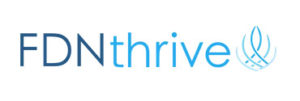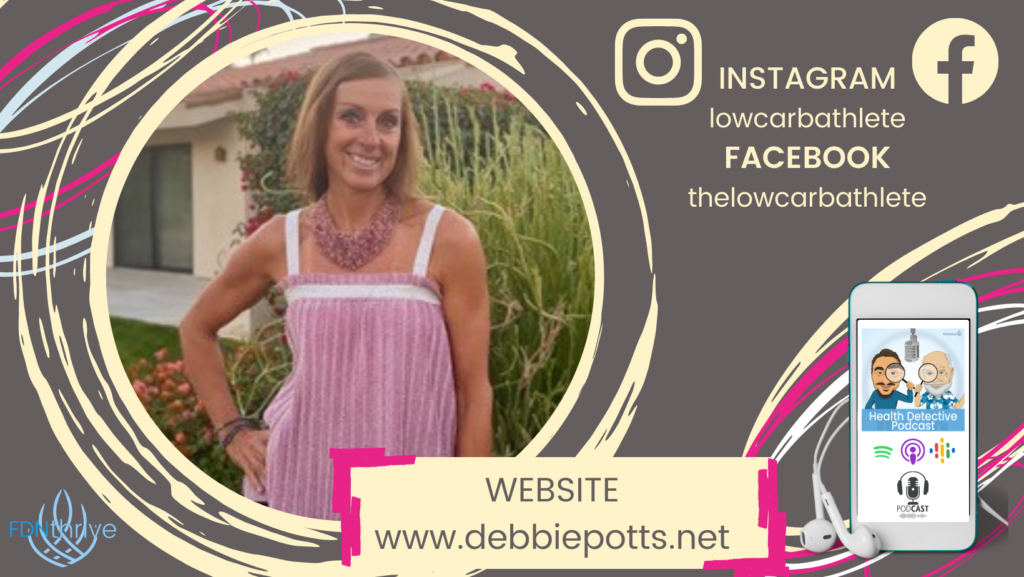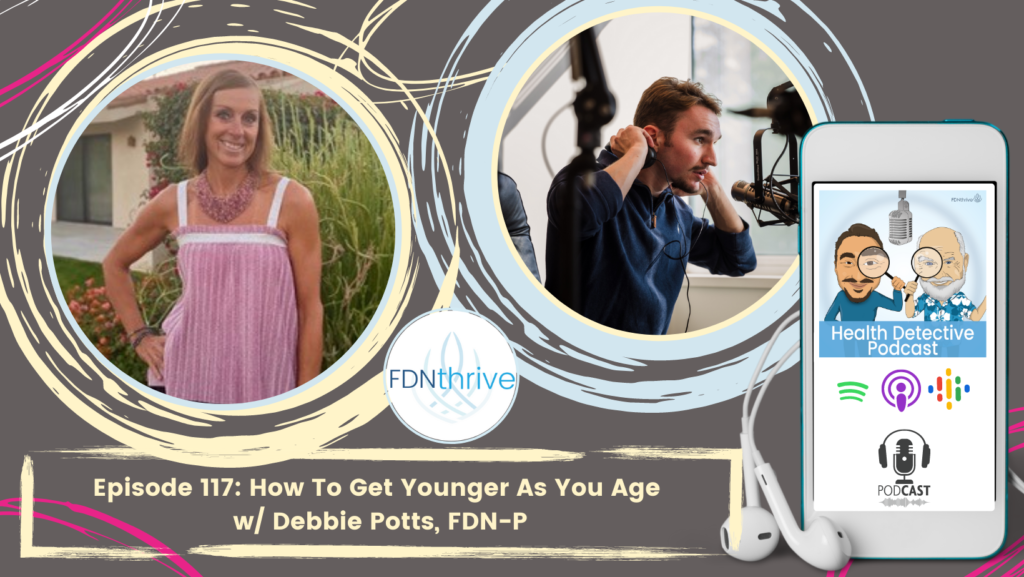
Introduction
[00:00:58] Detective Ev: Well, hello, my friends. Welcome back to another episode of the Health Detective Podcast by FDNthrive. My name is Evan Transue, AKA Detective Ev. I will be your host for today’s show. We are talking to longterm FDN almost 10 years now, Debbie Potts, as she relates how to get younger as you age.
I think this is just such a cool Testament to FDN. The fact that there are so many people who have come on this podcast and been doing this for 5, 6, 7, 8, 9, 10 plus years, actually making a business out of this, actually making a living, getting to do what they love, and serving other people at the same time. I mean, what can you really ask for?
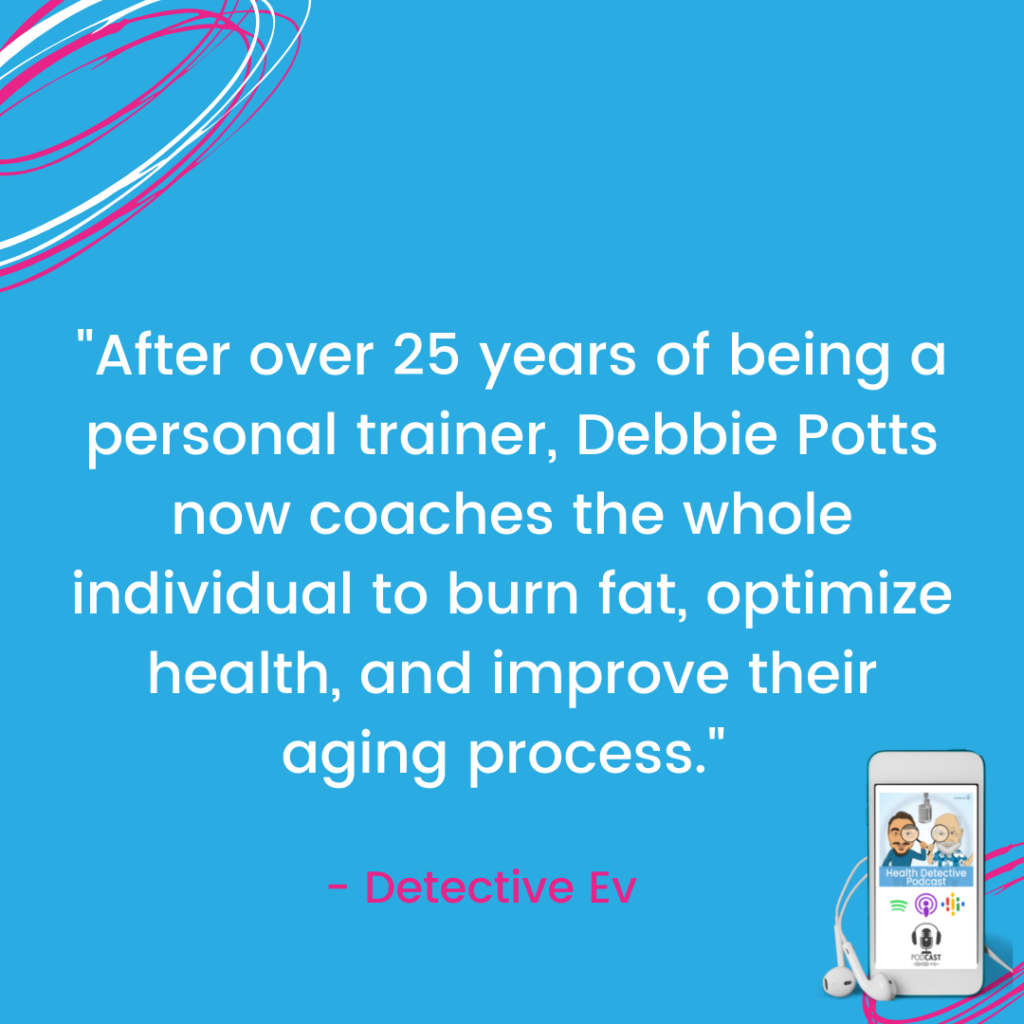
So, what happened to Debbie is this. After over 25 years of being a personal trainer, Debbie Potts now coaches the whole individual to burn fat, optimize health, and improve their aging process. Debbie helps driven, ambitious, high performing individuals who are trying to do all the, quote, “right,” unquote, things, get their body and vibrant self back again by investigating what is actually going on under the hood. She believes too many people struggle with unexplained, weight gain, chronic fatigue, and digestion issues. The worst part, they blame the aging process, or simply accept these imbalances as their new normal.
Instead of blaming aging, Coach Debbie looks at the whole individual by running a comprehensive investigation, as a health detective. Where have you guys heard that before? She doesn’t want you to waste years being stuck in the cycle of trial and error or just settling for these unexplained symptoms.
FDN Practitioner, Debbie Potts, Background
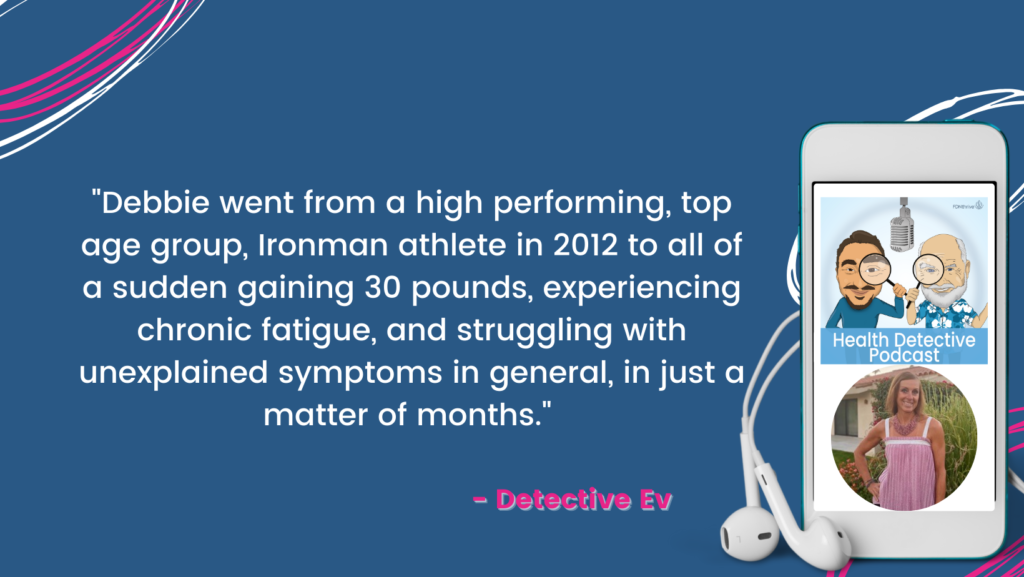
Debbie went from a high performing, top age group, Ironman athlete in 2012 to all of a sudden gaining 30 pounds, experiencing chronic fatigue, and struggling with unexplained symptoms in general, in just a matter of months. Now, not only is she feeling better than ever, but she is an author of the book, Life is Not a Race…It is a Journey, as well as a long-term podcast host of a show called The Low Carb Athlete, which is a weekly podcast to help athletes of all levels improve their ability to burn fat, optimize their health from the inside out, and achieve their peak performance gains.

Well, she was extremely fun to talk to. It’s always cool seeing someone that has done this long-term. It never gets old hearing about another person who lost their health and then got it back again doing the work and using the FDN philosophy. Without further ado, let’s get to the episode.
Hey Debbie, how are you? Welcome to the Health Detective Podcast.
[00:03:18] Debbie: Hey, thanks for having me on the show today.
[00:03:20] Detective Ev: We are glad to be with you talking to yet another Functional Diagnostic Nutrition Practitioner and one who is doing quite a lot of stuff – a podcast host herself. And I love the way this is going to go today because I like looking at the bios. I like getting just enough information about the person to be able to have an intelligent conversation. But the audience knows I love going in actually as ignorantly as possible, just so it’s really authentic.
Debbie’s Health Journey Before FDN
But I saw the whole low carb thing and that’s something as a skinnier guy who was told that he should be eating 400 grams of carbs per day at 20 to gain weight. I now know that is ridiculous and did not help my health so much. I’m excited to go that route if we end up there.
But to start off, we always start with the same question on this podcast. Really simple. It’s just, when did your health journey start and what symptoms were you exhibiting? Because really no one gets into this work without having had their own health journey.
[00:04:10] Debbie: So true.
I always say that too with my interviews with practitioners. We all have our own story and we’re following our own passion and purpose. Our own experiences bring us down this journey as a practitioner, for sure.
I was kind of a competitive triathlete, endurance athlete, marathoner, cyclist, since I was 29. I just somehow turned 50 years old last year. I still can’t come to grips that I’m 50. But I started doing triathlons and marathons when I was 28, 29 years old. I was also in the fitness industry since college doing personal training and health coaching in that space.
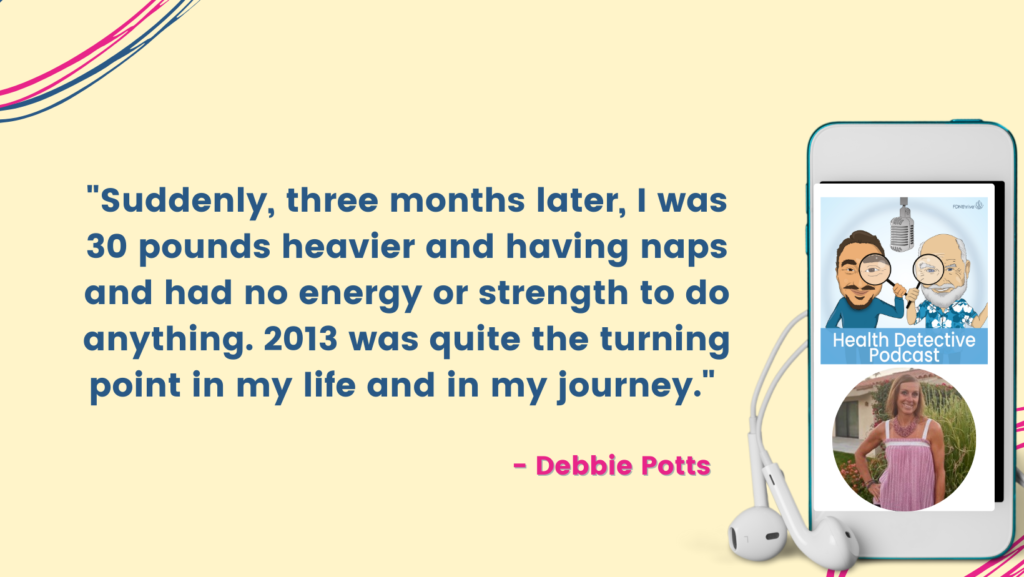
But my life changed as I knew it in about 2013. I started to feel fatigue and couldn’t sleep at night. Best shape of my life finishing Ironman-Hawaii and Ironman-Canada in 2012 and doing all these races, placing the top three. Suddenly, three months later, I was 30 pounds heavier and having naps and had no energy or strength to do anything. 2013 was quite the turning point in my life and in my journey.
FDN Teaches, Stressed-out People Can Sometimes Mask Their True Health
I was already doing some health coaching, doing a lot of different continuing education in that space. But it really led me down the path to nutritional therapy and FDN and functional lab testing, and really figuring out the “why” and what was wrong with me, because I can never get help myself. And that brought me to writing a book called Life is Not a Race…It is a Journey. That it’s seeing all these different practitioners and doctors and experts in fatigue and functional medicine and not ever getting results until I started going into it myself, as most people say.
[00:06:00] Detective Ev: I always find it remarkable because we have people – athletic fields or personal training or whatever. But that’s some serious stuff you were doing obviously.

And I always find it so interesting. I think the audience especially does, considering not everyone’s an FDN, on how you could be capable of doing something like that. You even said yourself, the best shape of your life, yet were not feeling good. The body will adapt to what we make it do as long as it can at least. But that doesn’t mean that there’s not consequences to that, and there’s not major stress going on.
I love taking any opportunity I can to really expand society’s view on this. For his privacy, I’ll be vague. But I have someone that I know in my life that is a top-level athlete, yet this person comes to me with gut issues and mental health issues and all this stuff. But they are performing at the top of their field on national levels.
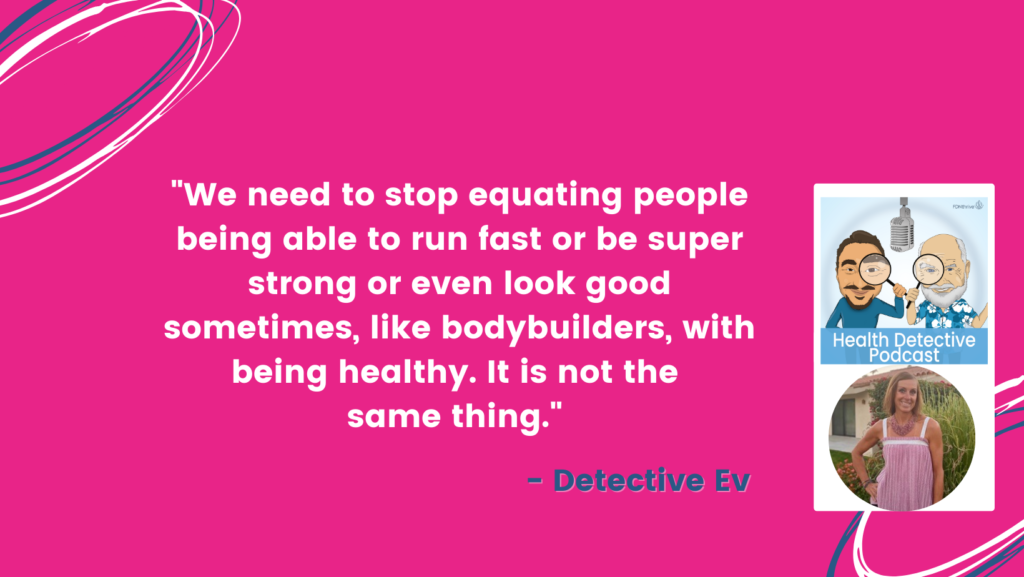
And it’s like, yeah, well you can do that sometimes and really not be in the best health. We need to stop equating people being able to run fast or be super strong or even look good sometimes, like bodybuilders, with being healthy. It is not the same thing. You know what I mean?
Look Healthy on the Outside, but Hidden Stressors on the Inside
[00:07:03] Debbie: For sure.
That’s what I’ve said over the years as I kind of switched my focus as a health and fitness coach, adding FDN practitioner work into my style of coaching, personalizing their nutrition and exercise program, what I call the holistic method. I’m really going, are you fit and healthy from the inside out? Because if you go watch an Ironman triathlon, if you go watch a marathon, the people do not look lean, fit, strong, healthy. There are very few that actually look really fit and lean, and that even could be misleading as well.
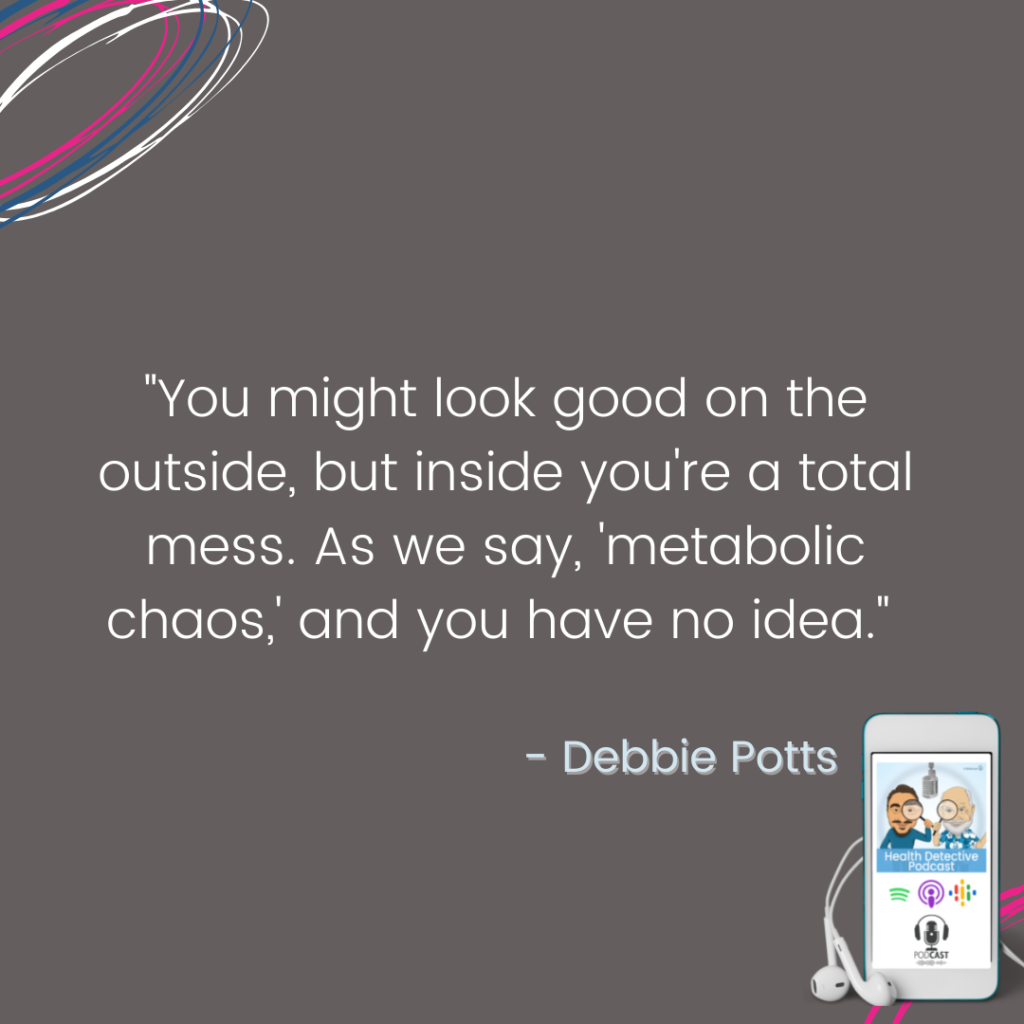
You might look good on the outside, but inside you’re a total mess. As we say, “metabolic chaos,” and you have no idea. Even myself, like I was thinking I was thriving and doing the best at races and performing at a high level. But underneath all this, chronic hidden internal stressors were brewing inside of me.
I would say, I didn’t just suddenly burst March of 2013. It was like this volcano slowly erupting until suddenly there’s no more I could hold in, and it just exploded. I think a lot of athletes have that going on. I feel that’s my kind of purpose now is to help other athletes and aging athletes prevent going through what I went through.
It’s not something we have to do. It’s something we can control if we identify early on those big, major, red flags that us top, high-performing, ambitious individuals can really stop, pause, and go wait, that is a red flag. We kind of think we’re tough and we override those and push through it.
[00:08:46] Detective Ev: Yeah, absolutely.
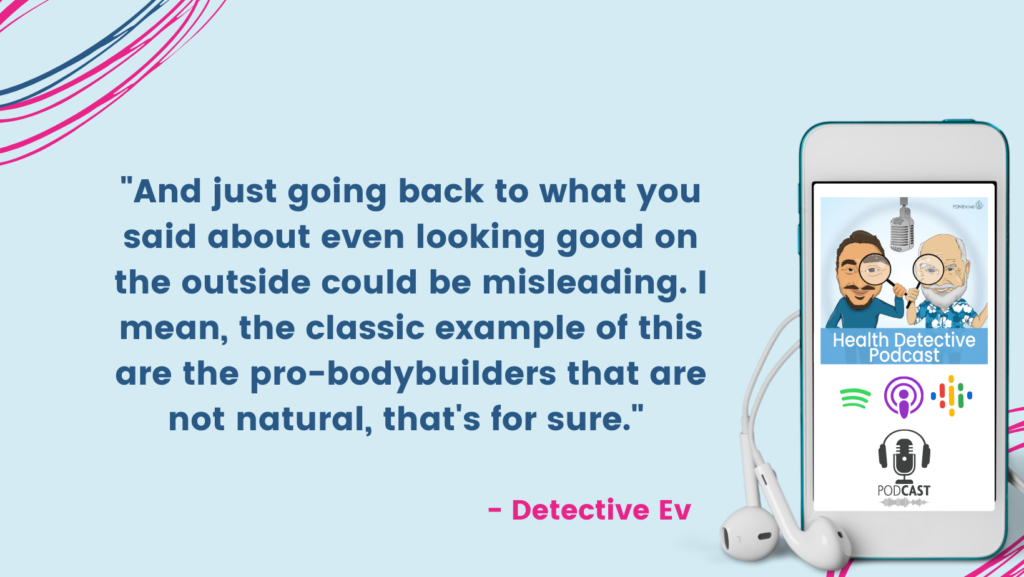
And just going back to what you said about even looking good on the outside could be misleading. I mean, the classic example of this are the pro-bodybuilders that are not natural, that’s for sure. I mean, most people, not everyone, but a lot of people do consider them the pinnacle of aesthetics. And wow, these people look amazing, but yet some of them die at 40 years old. That’s a problem, guys.
New Generation in a New, More Toxic World
You know, you could look great, but that doesn’t mean that everything’s going well as obviously was the case here. I think the other thing is too, sometimes the “Type A” entrepreneurial thing. My generation. I know I’m being biased because I’ve dealt with this myself. We see people that are working 70, 80 hours a week. Maybe the older generation are doing this stuff, and we wonder why we can’t do it.
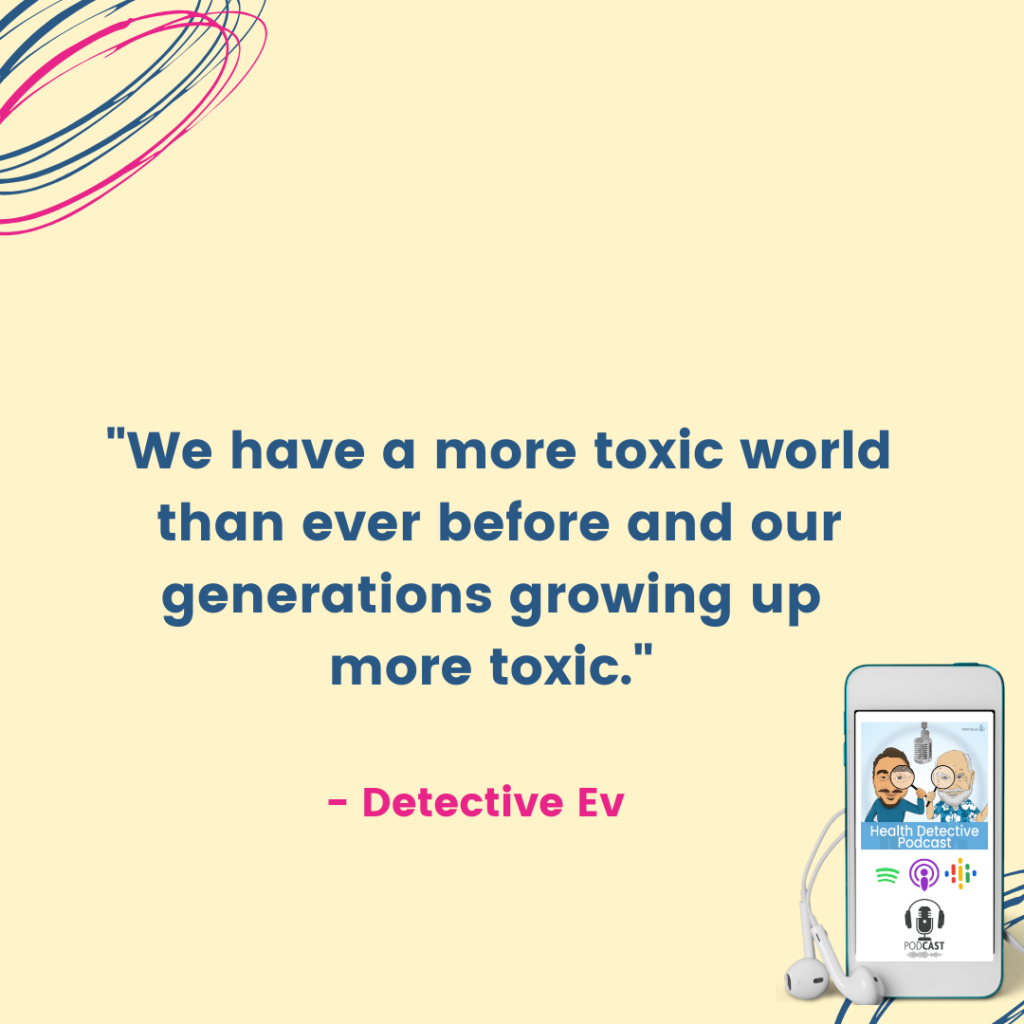
I think the problem is this. We have a more toxic world than ever before and our generations growing up more toxic. I think it’s much harder for us to get away with the 80-hour weeks while also being exposed to blue light and never having really gotten a good night of sleep, spending our entire lives on video games and Netflix and all this stuff. Social media. I hate to be that guy, but like social media, adding to the mix too. There’s more stressors going on. We’re capping out faster than our parents or especially our grandparents.
I’m just curious, because clearly you were into some form of health if you’re able to be an athlete like that. Were you into any of the natural or functional stuff or was it purely just for performance that that’s where your relationship with health was?
Interest in Many Health-Related Subjects & Events
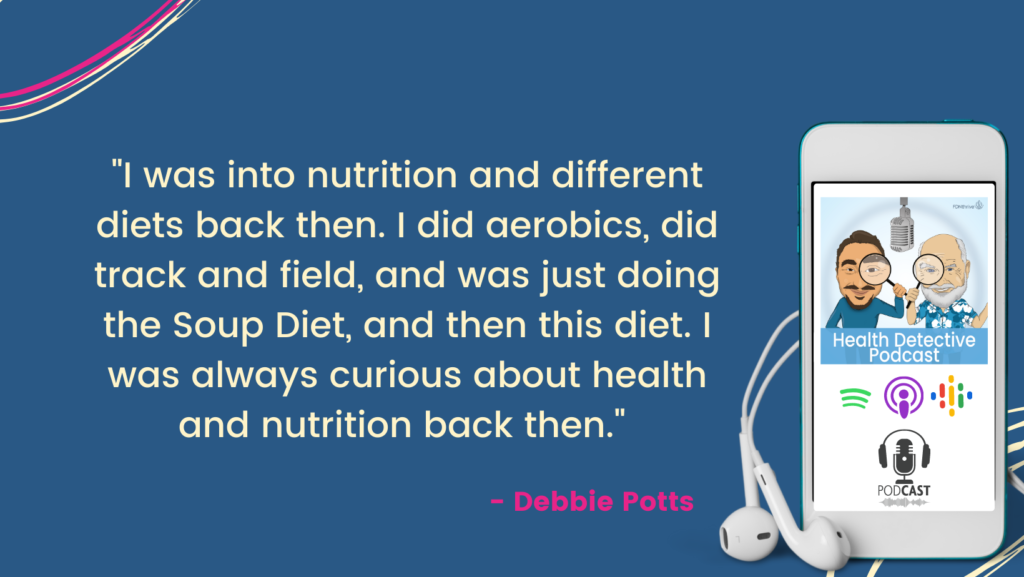
[00:10:04] Debbie: I always was interested in health in even high school. I was into nutrition and different diets back then. I did aerobics, did track and field, and was just doing the Soup Diet, and then this diet. I was kind of into dieting, which is not a good thing. I was always curious about health and nutrition back then.
Then in college actually went to look at Exercise Science. Then thought, oh man, I’ll do dietician. Then I realized that was all chemistry and physics and not my area of expertise. I didn’t want to do that route. But I’ve always been curious of nutrition my whole life. I was into Health and Exercise Science, obviously in college.

Then afterwards just got into doing endurance events and found out it was easy for me, it was comfortable. I started running races and marathons, as I said, in my late twenties. Then I got into cycling, and I thought might as well do an Ironman. I just need to start swimming longer.
I had groups of friends to train with. Then we started doing these races, but you get sucked down that path of Ironman and then marathons and cycling events. Then suddenly you’re kind of doing that year-round, and that’s your lifestyle, that’s your hobby.
The Nutrition Part
Nutrition and health was always a curious part of it for athletes and how do we do that? I remember the Zone Diet and all this other stuff starting to come out in the early 2000s.
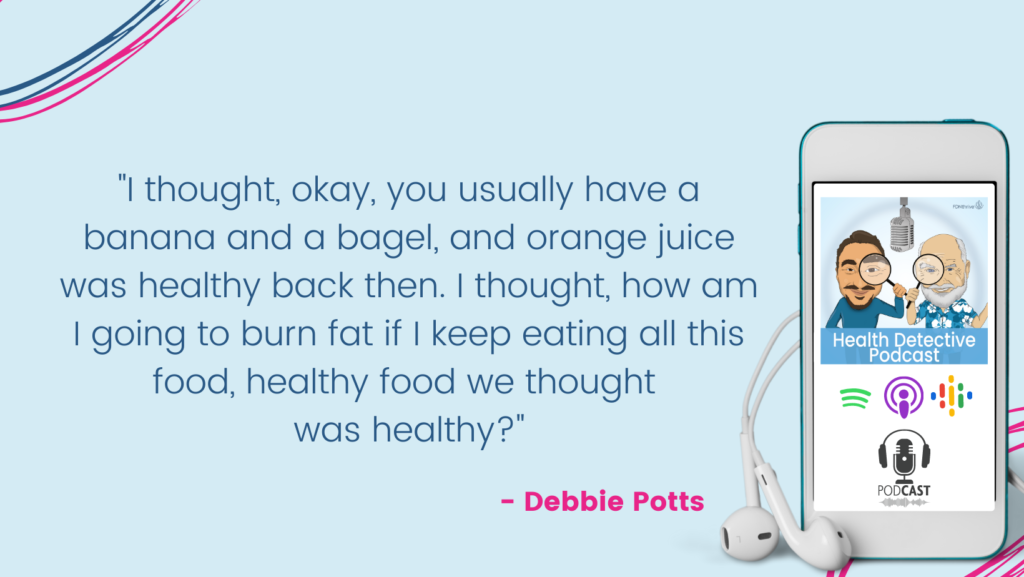
I was into heart rate training. Early on, I discovered, oh, do I need to eat? I’m not losing any weight. Maybe I just won’t eat. I taught Spin Class on Saturday and then I started getting into riding bikes. I’d meet people to go for a bike ride to train for events. I thought, okay, you usually have a banana and a bagel, and orange juice was healthy back then. I thought, how am I going to burn fat if I keep eating all this food, healthy food we thought was healthy?
Then you hear as athletes, you’re supposed to eat 300 calories an hour. I’m like, okay, I’m not losing any weight, what’s going on? So, then I thought one day I wouldn’t eat anything, and I totally bonked. That was 2000, 2001. Then I started getting more curious about nutrition and how do you burn fat as an athlete if you’re eating every hour?
So, I kind of started down this path early on. Didn’t know about being fat-adapted athlete, metabolic efficiency. Started getting into that testing on people, resting metabolic rate and exercise rate in 2005. I started early on before all this stuff had labels on it, you know, names for everything.
[00:12:31] Detective Ev: We will hop to that for sure, because that’s super important to me.
FDN Opens Minds to HPA Axis Disfunction
I’m someone who wasn’t an athlete at the level that you were for sure, but I was always interested in fitness and went through the same transition. What I want to rewind to for just a second is you get into FDN. I’m always so curious about what did you find, because I know many people are listening and they’ll relate to exactly what you just said.
I think I’m healthy. I’m doing stuff like you were doing. I thought everything was fine and yet I’m not. But no one was able to help me. How does FDN help? What did you find there that you had not found yet previously?
[00:13:02] Debbie: Well long story short again, I wrote a book: Life is Not a Race…It is a Journey.
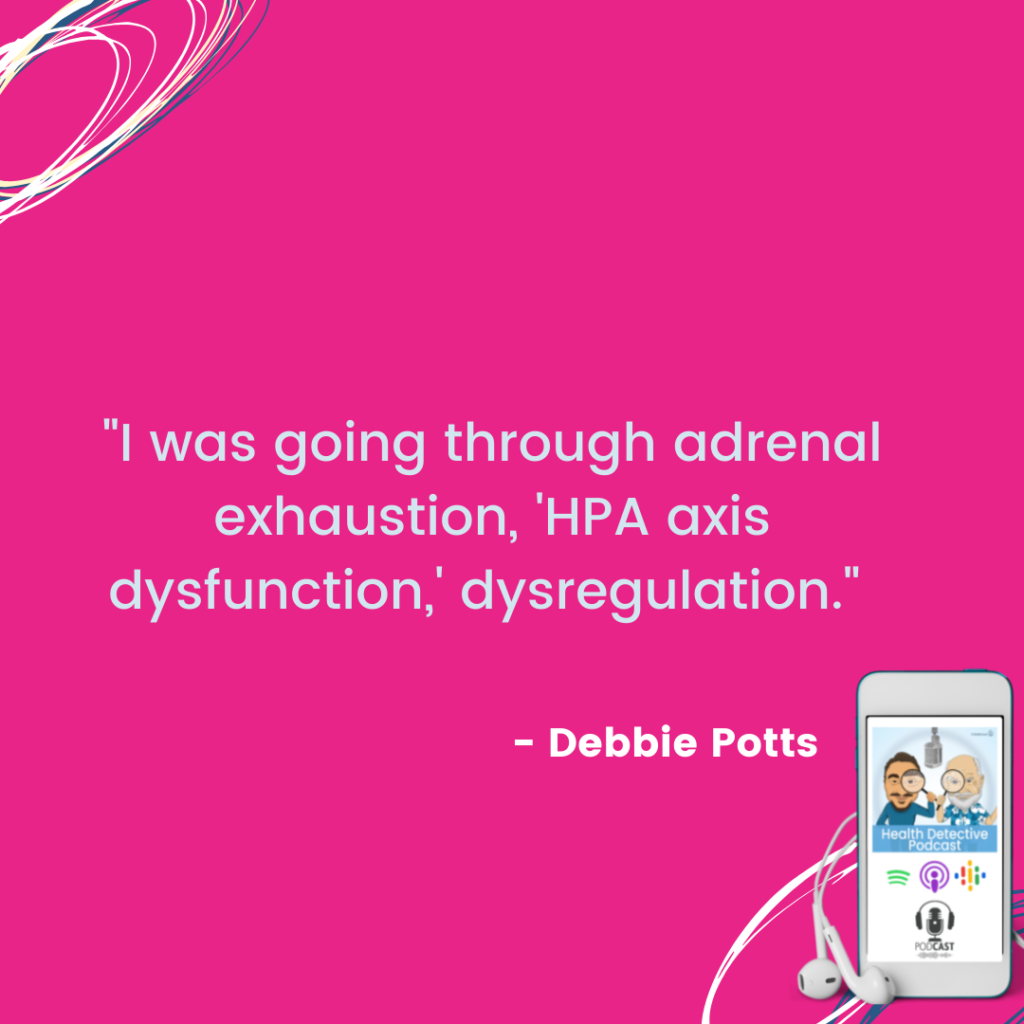
Reed Davis was at the time when this aha moment happened that I really wanted to do FDN. But I was going through adrenal exhaustion, air quotes around “HPA axis dysfunction,” dysregulation. I was always curious about this lab testing, FDN work. I’d hear Reed talking to Sean Croxton on the podcast early days.
FDN Labs Reveal Hidden Stressors
I was wanting to learn more because as I was trying to get help from 2013 on with my “why.” Like, why do I feel like this? Why I have no energy? Why am I gaining weight? Why do I have to have naps in the afternoon? Why can’t I sleep at nighttime? All those typical red flags when we have hormone dysfunction and metabolic chaos. No one was running the right labs on me, as I know now.
I saw eight, nine different doctors, practitioners, experts. Wanted to do FDN and finally became FDN practitioner a few years ago. I was owning a fitness studio for 10 years. That kind of took all my finances and energy. And stress – part of my reason I had health issues running my own business.
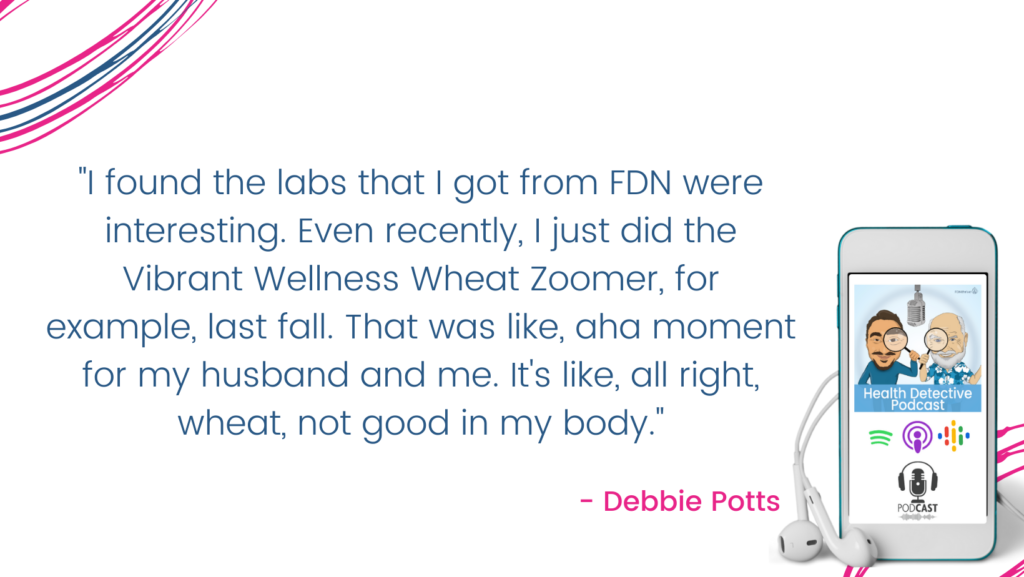
I found the labs that I got from FDN were interesting. Even recently, I just did the Vibrant Wellness Wheat Zoomer, for example, last fall. That was like, aha moment for my husband and me. It’s like, all right, wheat, not good in my body. You think you feel okay because I don’t have any digestion issues. But wow! That was a huge inflammatory food in my whole body.
Then before that, when I ran the regular labs we do in the beginning, I thought I was so much healthier. And I wasn’t back to where I was, it was just, it’s been eight years that I’ve been struggling to get my own health back and feel my best.
Part of that was releasing stress. I luckily closed my fitness studio in 2019, October, before our pandemic started. That was even better to release some stress. Then I moved from Seattle to San Diego where I can thrive a little bit more in sunshine and good weather, even though it’s raining right now.
FDN D.R.E.S.S. Protocol Changing Lifestyles

But I changed my lifestyle. I had to change my whole life to really get healthier. One thing I would say is doing all the lab testing is essential, but the D.R.E.S.S. that we talk about for our clients and ourselves (the D.R.E.S.S. for Health Success protocol we give people), is so essential. Because I can’t blame those eight, nine different practitioners and doctors I saw over the years. It was me that had to change my lifestyle.
I can do all the labs I want. I did that many times with an expert, with a different practitioner, different naturopath. I’ve done these labs for years. But until I took ownership for my own health, made those drastic life changes, change my mindset, change my whole day, I wasn’t getting better because I didn’t do as much changes as I really needed to do to thrive and get my health back again. The lab testing was essential but doesn’t really change if you don’t change your ways of doing things.
[00:16:07] Detective Ev: I love that so much. I might make that our excerpt for this podcast, because I always like to highlight the best thing. Because if people just took that little part, that it is our responsibility, that’s what it is.
Thankfully, by the time people get to FDNthrive, they usually are pretty ready in that sense. But occasionally, someone gets through where it’s just like, they’re not fully ready to do this. It’s funny cause they have the money, they got the time. They can do this, but they haven’t gotten this right yet.
Mindset Has to Be Ready for FDN Work
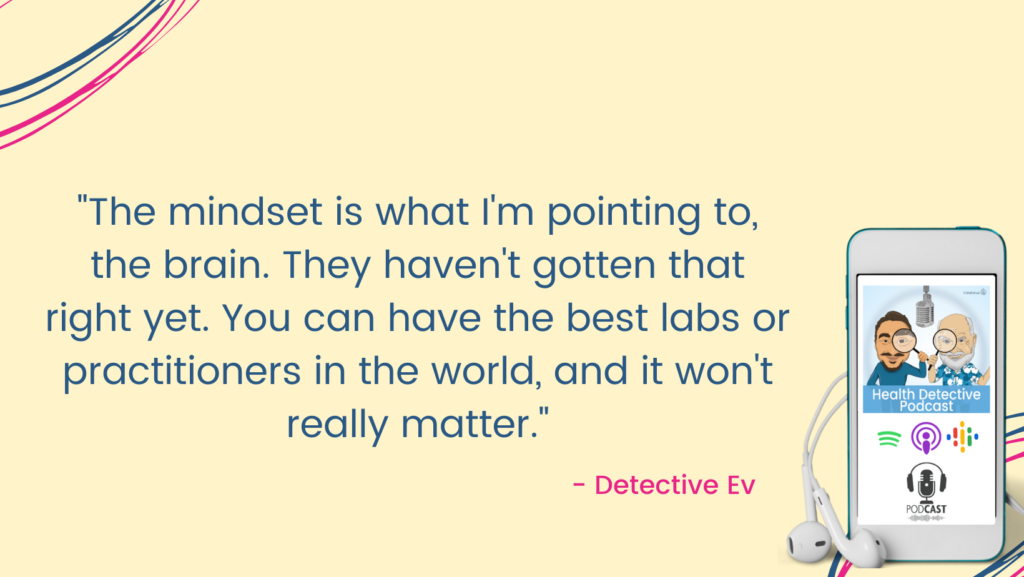
I know we might not be on video. The mindset is what I’m pointing to, the brain. They haven’t gotten that right yet. You can have the best labs or practitioners in the world, and it won’t really matter. I love that FDN always starts with that. Even myself as a graduate of several years, you know, you’re in the professionals’ group and you’re seeing all this complex stuff, which sometimes is relevant in today’s world.
But at the end of the day, it’s like, we can’t even start having that conversation if this person’s still going out and partying two nights a week and getting bombed till two or three in the morning, what are we talking about gut bugs and food sensitivities for?
I can tell you your problem right now. Like we gotta get to bed on time. That’s probably the first place to start. We got to stop putting a toxin in our body. It’s easy enough to get caught up in the weeds and the results and forget that, but it is really important. I thank you for highlighting that.
Career Change to FDN
Well, you said that you’ve kind of been on this journey for a while now. How did FDN though become something that you wanted to do? Because I’m assuming this wasn’t your career when you were doing these races originally, at least. what inspired you to really make this your career?
[00:17:31] Debbie: Well, I’ve always been fitness, personal trainer since out of college. And I ran fitness centers in college. I ran as health fitness director for clubs. I’ve been in the industry, but not testing.
I found as a personal trainer I really was evolving. I did Paul Chek’s program, holistic lifestyle coach. I did nutritional therapy practitioner. I really felt like I couldn’t help people totally because it is nutrition, eating real food, and our lifestyle habits, and how to train correctly – not too much, not too little, the right amount called “the Goldilocks effect” for everything.
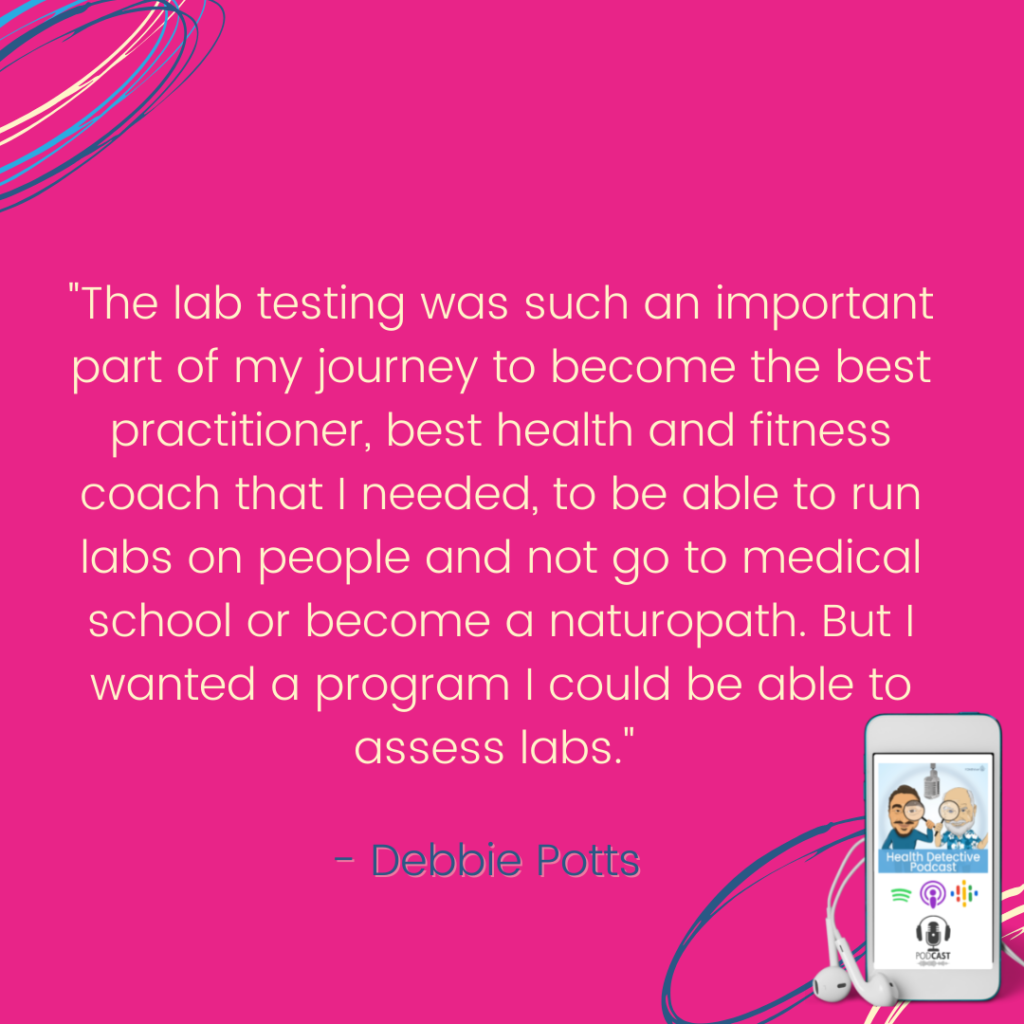
But the lab testing was such an important part of my journey to become the best practitioner, best health and fitness coach that I needed, to be able to run labs on people and not go to medical school or become a naturopath. But I wanted a program I could be able to assess labs. That’s why I love our medical director program. I go through labs with experts in there, cause I can’t be expert in everything. I know a little bit about a lot. I like to have that, let’s go through and make sure I’m seeing everything that we can see to help this client.
But the lab testing was a big part. I’ve always done the lifestyle, the nutrition, and continuing to learn more about that part of it. You know, being able to run the Organic Acids test, doing a GI MAP, and understanding how those are additional clues. Really being a health investigator, as a detective we talk about here, that we’re always collecting clues. Those external stressors we can identify, but those internal, hidden, and chronic stressors we don’t know about unless we test.
That saying “test and not guess,” I say, I think every day we need to collect more data and doing the lab testing is part of that investigation.
Focusing on Fat-adaptation
[00:19:20] Detective Ev: Okay, perfect. This was just a logical extra step for you then. Add FDN. That makes sense.
I feel like when I’ve talked to the people who were really like, FDNs first wave, Sean Croxton in there, it was a lot of personal trainers. That’s who was originally coming through, and this has expanded so much now. We still have those personal trainers, and we have doctors, we have acupuncturist, chiropractors. We have people like me where technically I do have a certification in personal training, but I’ve never really used it.
People like me, this is kind of their main thing and it’s just amazing to see the diversity of this community and it’s simply because these issues don’t discriminate. It affects all of us. Now, again, as someone who loves the lower carb thing and truly focusing on getting fat adapted to the best of our ability in our modern world, I’d love to start talking about that in this podcast.
FDN, it’s not like we discourage that by any means, but we don’t necessarily go that route on day one. Was this after FDN that you started finding out about this? You referenced a pretty early data if I’m not mistaken, were you already doing that before?
[00:20:19] Debbie: I’ve had my podcast for 10 years talking about this.
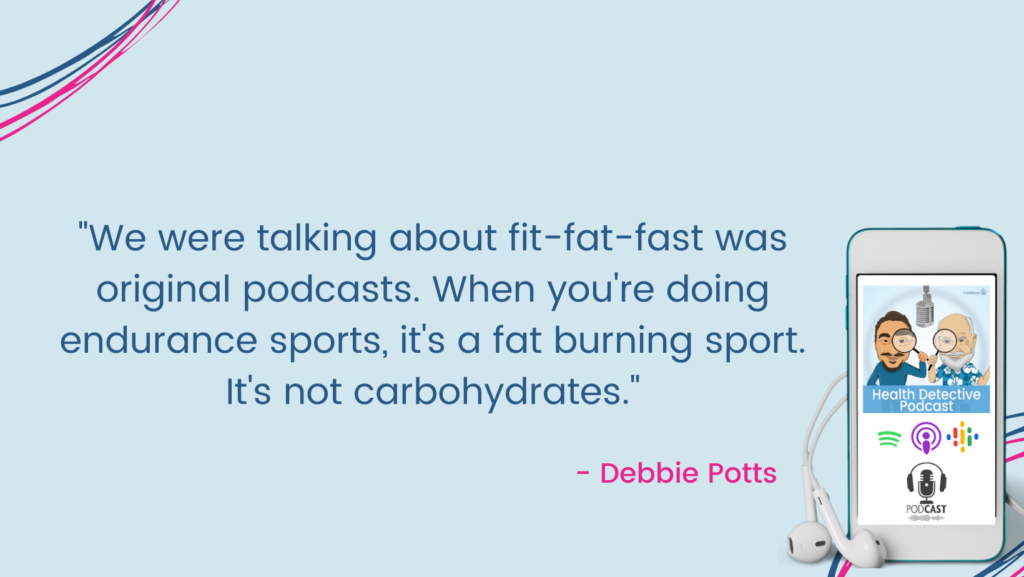
We were talking about fit-fat-fast was original podcasts. When you’re doing endurance sports, it’s a fat burning sport. It’s not carbohydrates. Teaching people how to be more metabolically efficient is what I originally was talking about. I used to do Metabolic Testing, as I said, in 2005 for years until the company got bought by Lifetime Fitness.
Sadly, I had to stop that, but I was testing people at rest and exercise. How efficient are you at burning fat? Where do you start to burn carbohydrates? So, I was always interested in that. I was interested in fueling and I trained by heart rate.
Low Carbs Doesn’t Mean No Carbs
I trained my clients by heart rate when they were doing their exercise, putting that all together into really a personalized plan. Nowadays, we use a CGM (continuous glucose monitor). You know, look at genetics, looking at their, like, if you can use Oura or WHOOP. Using all this data we can collect along with the functional tests and a Vibrant Wellness test or MRT food sensitivities.
And I personalize that nutrition program and their fueling, training plan. And really look at okay, how can you live your best life and be your best self and perform your best by making this comprehensive program just for you as a unique individual. Looking at carbohydrates as a fuel source, but more strategic carbohydrates. So, they’re not something that are essential, like essential amino acids, essential fatty acids, but you know, carbs.

I keep saying this on my podcast – Low Carb Athlete podcast – doesn’t mean zero carbs. It’s about real food that balances our blood sugar and where to place those carbohydrates that give you kind of that extra backup fuel tank as rocket fuel for an athlete, as well as putting them more at carb refeeds at nighttime. That will help optimize your sleep because they can convert into serotonin, help to make melatonin. Really looking at placing those carbs, (not crappy carbs, but real food cards) into your day and matching your nutrition and your exercise together.
It’s not about zero carbs (and I hate labeling anything as Keto, and Carnivore, or Paleo.) Everything is labeled. But just real food that gives you energy, helps you recover, repair, helps your sleep, help you thrive every day.
Confusion Around Eating Carbs
[00:22:40] Detective Ev: I’m not sure what’s more impressive, the fact that you were focusing on fat adaption back then, or the fact that you’ve had a podcast for 10 years. Seriously, at those times, they’re really not that talked about things and we’re still in a bubble, let’s be honest.
I mean, people know what the Keto Diet is. Even my dad’s heard of that. Everyone’s heard of it, but they don’t know what we’re necessarily talking about right now, where, can we see on a blood meter that you actually are getting into ketosis or something like that. They don’t know that. So, it’s really impressive that you were kind of doing that back then.
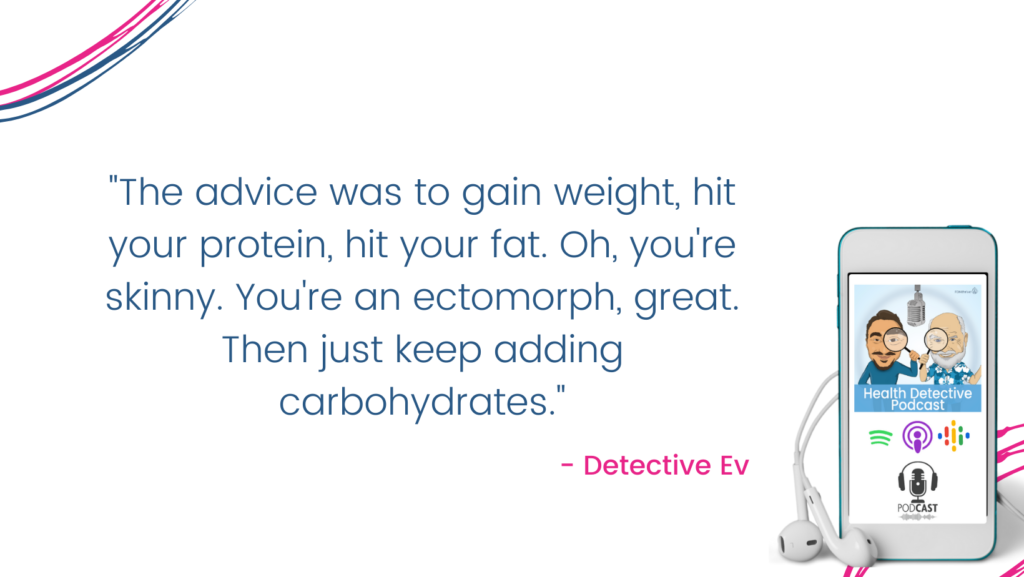
Again, I had this interesting experience, not being a high-level athlete myself but someone into the fitness thing. The first thing I ever got into was I wanted to be a natural bodybuilder. I thought that was kind of cool. Then, because I thought it was healthy, I realized even what they were doing. I’m like, we’re eating once every two hours. This was just nuts and it wasn’t working, and I wasn’t gaining weight properly. Now I had health issues my whole life. The advice was to gain weight, hit your protein, hit your fat.
Oh, you’re skinny. You’re an ectomorph, great. Then just keep adding carbohydrates. I got to the point, Debbie, where I’m at 400, 500 grams of carbs per day. This is all tracked. I have the logs from it and I’m not really gaining weight properly. My skin is terrible. I feel awful. I’m hungry all of the time. It was just a constant up and down battle.
FDN Coaching Around Individualized Monitoring
Literally, just today somewhat prior to this podcast, I’m able to go to the gym after being up for four or five hours. I don’t do this every day. I’m just saying I didn’t eat this morning at all. I went, I did squats. I did military press, deadlift. No problem, no changes in my energy. And I was able to eat afterwards. Again, I don’t do that all the time, but just the fact that I’m able to do that and I still feel great right now. I think is a sign that the body shifted.
I do track my blood ketones and I can see that even after I eat a good amount of carbs in a day, I can get into this.
How do you possibly break this paradigm for so many of these athletes? Because still today, I know so many of them would look at you and me like we’re crazy if we said we’re going to do these really highly involved athletic events without 400 or 500 grams of carbs, without eating 300 calories every single hour.
Do you find that there’s resistance to this mindset wise?

[00:24:39] Debbie: Well, let’s unpack. There is the process of being fat-adapted you start with first. And I keep talking about this theme of my show this year is to share this because it’s different. The guidelines we’re hearing out there for people that are promoting more nutritional ketosis for longevity, fat loss, health issues. It makes sense if you have metabolic chaos, you can individualize that with looking at food sensitivities and labs and metabolic typing. But I would say what to eat, when to eat, why are you eating, and how you’re eating? So, we need to look at all of that because it’s so individualized.
Males vs. Females Carb Tolerance
Exercising is a big topic right now. Fasted exercise, when do I eat? Before, or do I eat after? I keep diving deep into this into my world. Because I think a lot of, especially the aging athlete and the female athlete, we’re doing too much of everything. As all areas seem to be that top high performing individual that’s ambitious driven that I work with (because it’s similar to myself). We tend to take everything to the extreme: too much fasting, too much prolonged fasting for an athlete. Should you eat before, or should you eat after, or both? And when to break your fast, because what if you’re causing more damage than good.
What that looks like for you is going to be different for me, cause females and males are very different. Finding what minimal research there are on the female athlete versus male is different because women obviously have menstrual cycles. If they’re premenopausal and really looking at matching their nutrition and their training with the menstrual cycle is a whole other mapping out area that’s really growing.
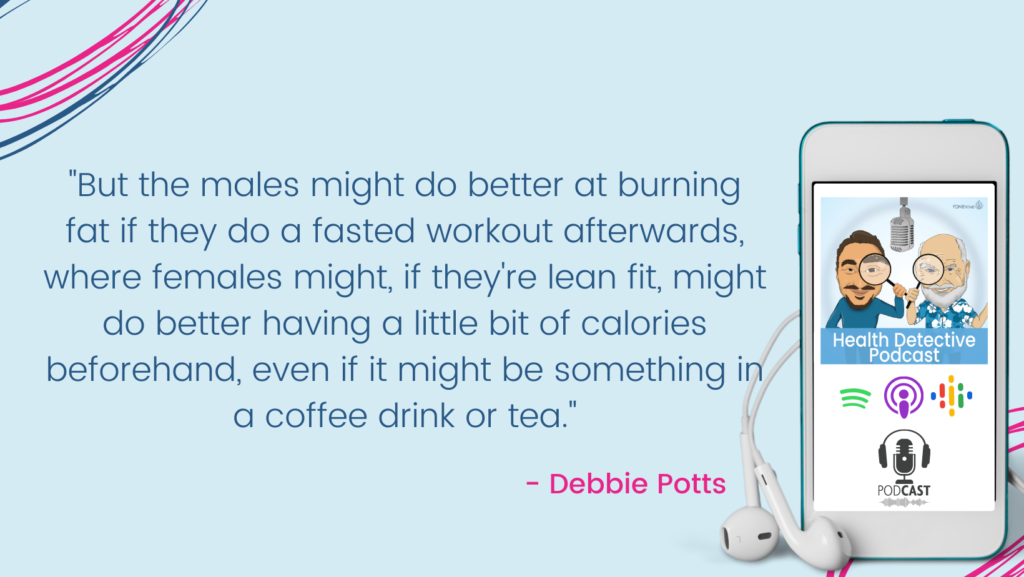
But the males might do better at burning fat if they do a fasted workout afterwards, where females might, if they’re lean fit, might do better having a little bit of calories beforehand, even if it might be something in a coffee drink or tea.
So, I think the fasted exercise is huge. Doing low carb but carb timing (and really, I’m trying to teach people that it’s not zero carbs), you might do better and perform better and even lose fat weight if you have a little bit more carbs. But just to finish up with what you’re saying, like eating more carbs, it is finding that individual carb tolerance.
Metabolic Flexibility
They did an amazing interview with Robb Wolf recently on placing your carbohydrates. You could have 200, 300 grams of carbohydrates and still be burning fat as an athlete. So that doesn’t kick you out of nutritional ketosis and what’s called metabolic flexibility. We don’t necessarily need to be in nutritional ketosis 0.5 to 1.0 every day.

It’s beginning that flexibility shift back. Fat burning is your main fuel tank, and your backup fuel tank is carbohydrates and being efficient. Be able to flip that switch when we need that extra fuel tank, that backup engine as carbohydrates.
[00:27:39] Detective Ev: He was one of the authors of Sacred Cow, correct?
[00:27:43] Debbie: Yeah.
He wrote Sacred Cow and The Paleo Solution. He’s really good that athletes, especially his area’s – CrossFit – that they need to have a little more carbohydrates. Then there’s people that argue carnivores, zero carbs, carbs are not essential, because protein can be converted into glucose via gluconeogenesis. So, I’m not going to eat a steak or a burger patty before I go swimming. It’s not going to be effective for me.
So, being able to have easily digestible foods and what to eat for athletes I think gets confusing out there for people.
[00:28:17] Detective Ev: Absolutely.
The FDN Gift of Investigation and Education
I liked that you mentioned the individualized thing and even figuring out the carb tolerance. Because that has been the one advantage of someone like myself who does maintain a pretty lean physique, no matter what. Even my dad’s the same way.
I can’t imagine this changing too dramatically, I would never be a 300-pound person, something would have to dramatically change. I like to just test sometimes, how much can I get away with? And it was interesting because the other day I’m lifting, I’m exercising. I ate 70, 80 grams of net carbs and all of 14 hours later, I’m a 1.0 on my blood ketone meter.
That’s after four or five years of consistent on and off intermittent fasting. I know consistent and on and off sound funny. I just mean in the sense of, like you said, you don’t want to necessarily be doing this every day.
And that’s what I thought in the beginning. I’m going to fast 16 hours a day every single day. But then you’re not necessarily accounting for, well, did I have a lot of output today? Did I do a ton? Like you might need to make up for that.
Even just yesterday, this is a rare occurrence for me. I like to not really eat too late at night, but it was 7:30 and I’m hungry. I didn’t eat enough today to really match my output. It’s like maybe humans weren’t supposed to be eating a huge meal at 8:00 at night. Probably not, but they’re also not supposed to be malnourished either.
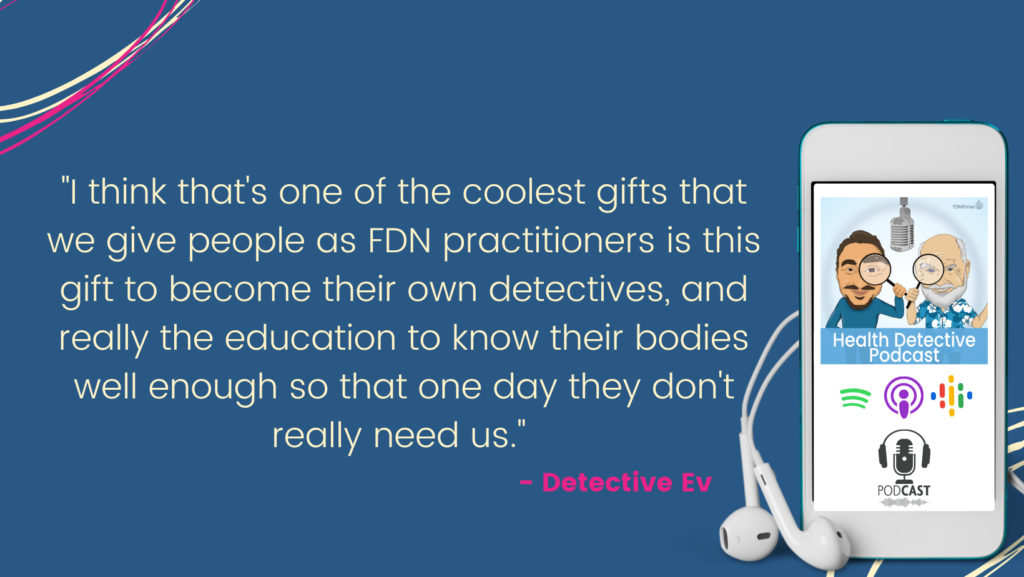
It’s like picking my thing and I did that and felt really good this morning. Actually, good enough to go to the gym, for hours fasted just in the morning, and lift weights. So, I made the right choice for my body. I think that’s one of the coolest gifts that we give people as FDN practitioners is this gift to become their own detectives, and really the education to know their bodies well enough so that one day they don’t really need us. They know how to be intuitively doing things again.
Embrace the Varying Changes
When they come to us almost by definition, you have to be so out of sync with your body and your needs that that’s why you kind of need someone like us. Of course, it’s a little more complex than that, but you know what I mean?
[00:29:59] Debbie: That’s why I do more comprehensive coaching, not unlimited, but just full-time coaching with someone for six months and we call it our VIP program. We work on all of those elements that I call holistic method or like similar to the D.R.E.S.S. Protocol, that we’re working on their exercise and nutrition and movement throughout the day and their hydration and digestion.

Happiness is a big part of it for my program that I’m really coaching people full time on their nutrition, health, and lifestyle habits and individualizing it. What’s an ideal day look like for you? And that’s going to vary day to day, like you just said, matching your nutrition with your exercise and teaching people to get through that fat adaptation process if they’re coming from a carb burning, blood sugar dysregulation background (which most people are), towards being intuitive, fueling, and intuitive training for me and myself.
Working with the aging athlete and teaching them how to look at things, a different approach in our forties and up than what you did when you’re 20, 30-year-old, you can get away with a lot of things.
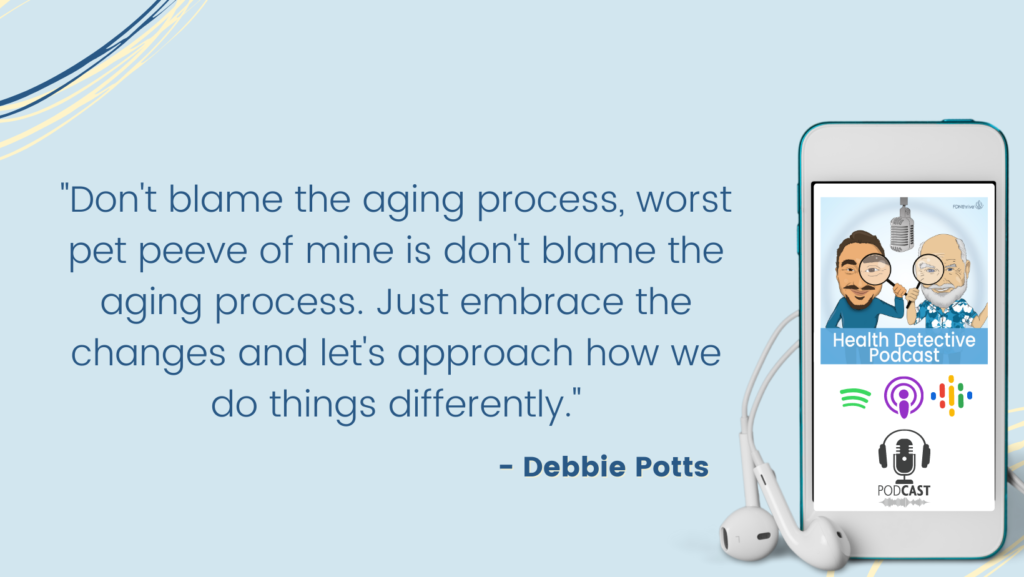
But now it’s like, all right, don’t blame the aging process, worst pet peeve of mine is don’t blame the aging process. Just embrace the changes and let’s approach how we do things differently. How we eat is going to be differently and how we train, sleep, and recovery is going to be important.
Using All the Wearable Health Gadgets

So, really looking at that big approach and using Oura ring, using a WHOOP, and other CGMs, really looking at the whole picture along with the functional labs so we can figure out the best program for you. But varying it day to day, like you said, the exercise loads are going to be different than yesterday to today. It’s always really figuring that out for someone.
[00:31:42] Detective Ev: This podcast. I got to get us some more sponsorships. We’ve never really taken that route yet. But the Oura ring, I’m so excited to try all this stuff. I just got finally sold on that the other day by someone who came on. I just think it’s cool. I want to track that and see different things with my sleep.
If I’m not mistaken, an Oura Ring, don’t they give you kind of like your readiness scores or is that a different device?
[00:32:02] Debbie: So, I coach clients WHOOP and Oura, and I’ve used Oura for a year now. Both give readiness. WHOOP will say it as your “strain.” You’re both going to get your heart rate variability.
Those are choosing between an Oura – it’s a ring, which you can’t see in the video, or the WHOOP band. I didn’t want that because it’s on your wrist. I hate things on my wrist, so I’m not going to sleep with that. It depends on what you like. I have some clients have WHOOP because they hate wearing a ring. It depends on what you like and what will you keep. But it is really biohacking, so to speak. What works for you because it is N equals one experiment and this ongoing journey, and you’ll learn.
Common Sense Stuff
Superbowl Sunday, I was up and didn’t put my blue blockers on watching the game. We taped the game. I put it on later cause we were outside doing yard work and stuff. So, I didn’t want to watch the game at 3:30 here, as an example. And I ate dinner at 6:00. It was later cause we’re outside doing stuff.
Well, my sleep score, deep sleep, was in the garbage. I mean, I’m usually 20, 30%. It was 3%, 5% that night. I, usually just weekdays, eat two o’clock, three o’clock is my main meal. I cannot eat before bed. Two, three hours is like worst deep sleep. So, you really learn how to take all this info we coach people on and really figure out what works for you. What is your body saying? Having different metrics so we can test and not guess what works best for you. We don’t know unless we have that data.
[00:33:26] Detective Ev: I love that you mentioned that because I kind of had already alluded to it in a sense. But you said it better where a lot of people really don’t do too great on that whole eating late thing.
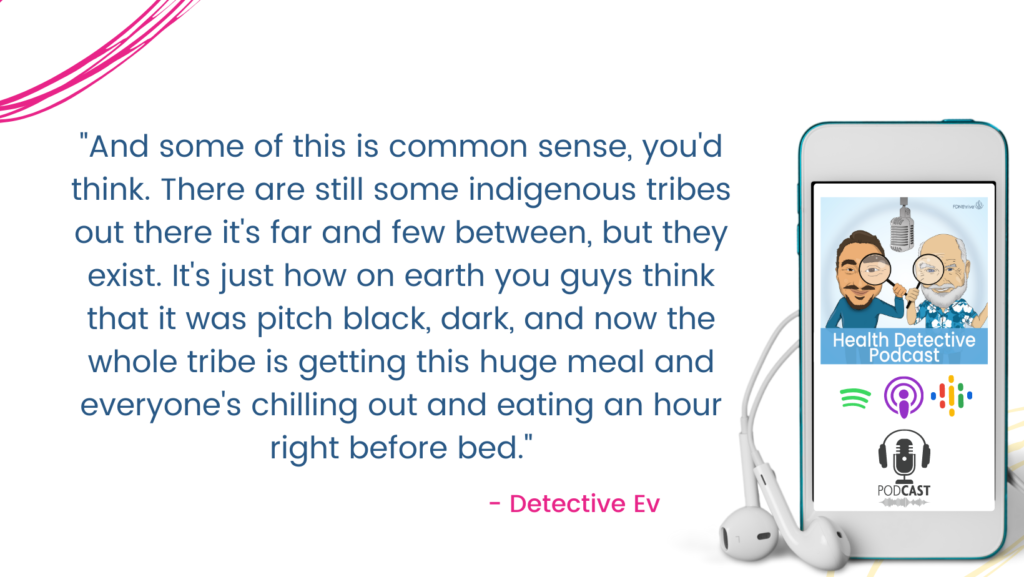
And some of this is common sense, you’d think. There are still some indigenous tribes out there it’s far and few between, but they exist. It’s just how on earth you guys think that it was pitch black, dark, and now the whole tribe is getting this huge meal and everyone’s chilling out and eating an hour right before bed.
I don’t feel like that would have been realistic. I think it would’ve made a ton of sense that they would have utilized daylight to take down potential meal or something like that. Then, what do you call that? Like gather certain things from the woods or whatever. I can’t imagine we were doing that at 9:00 PM in pitch black darkness. I don’t think that would have been the human being way. Much of it’s common sense.
Then you get to this next level of almost just knowing it intuitively. I’ve never used some of these things that track my sleep. I can tell you for a fact that I’m like you where I just do not do well eating right before bed.
I think most people know this with the example of a steak. We all know that if we ate a steak at 8:30, 9:00, and we go to bed at 10, we’re sleeping like not so great that night. But it does apply on a smaller scale with other things. That’s why I’ve been interested in this more objective data. I really want to know how these little changes that I do, do affect the sleep, so I appreciate you bringing that up.
More Effective with the One-on-One FDN Journey Together
Now I always like to give some time for people to really talk about client successes, especially someone like yourself who’s been doing this for a long time, especially compared to most FDNs.
I’d love to know what are some of your top clients’ success stories that come to mind, to the ability that you’re able to share them for privacy reasons. We’re really able to do some amazing work as FDNs. I’m curious if anything comes to mind.
[00:35:01] Debbie: Yeah, I’ve done the coaching packages with people that you meet once, twice a month.
But what I find the biggest success with is, and what I’m focusing on more in my coaching program for clientele is this six-month program. We talk every day, we use Voxer. They can reach out to me. They don’t have to talk to me every day, but they can reach out to me, and we have weekly calls.

I’m watching their CGM. I’m watching their WHOOP or an Oura score. I’m collecting their data. We’re doing the lab testing every four, six months depending on the person’s budget and what they’re working on. We’re always course correcting. It’s having this one-on-one journey together that I am along the road with them to get them started, then some of them go longer.
It is working on all the nutrition, health, and lifestyle. Their exercise program as well and doing all this comprehensive approach. I find having that connection with people, oh, they’re going out of town, or they have a trip coming up or they have a meeting. We can identify what we need to tweak and adjust based on having this longer journey together, rather than just talking to them once a month.
I just didn’t feel like I was making as much impact and helping inspire people to change. I know my own journey was always looking for someone to help me, not just go over what supplements you should take. But as I said, I didn’t really start to get healthy until I changed my way of life.
I changed my work. I went from owning a personal training studio, running everything, teaching classes, doing infrared sauna, treatment for nutritional therapy, all of that, I did everything. That was a big part of my stress. So, changing that to just doing FDN work full time, but taking my whole 25 years of experience in health and fitness, and then combining it with FDN practitioner work to now do a personalized, holistic method I call it, coaching program to help the aging athlete and others that just want to feel their best and think, I can’t get any help and be that person. Like, okay, let’s go in and dive in a little deeper and change and create these new positive habits that you can carry on with.
FDN Client – Hidden Food Stressors
[00:37:14] Detective Ev: Okay. Going back to the question though, is there a specific example of a client testimonial or something where someone comes to you and is at the end of their rope and we’re able to be the ones as an FDN that really helps them turn it around.
[00:37:27] Debbie: I know, I didn’t really answer your question. True.
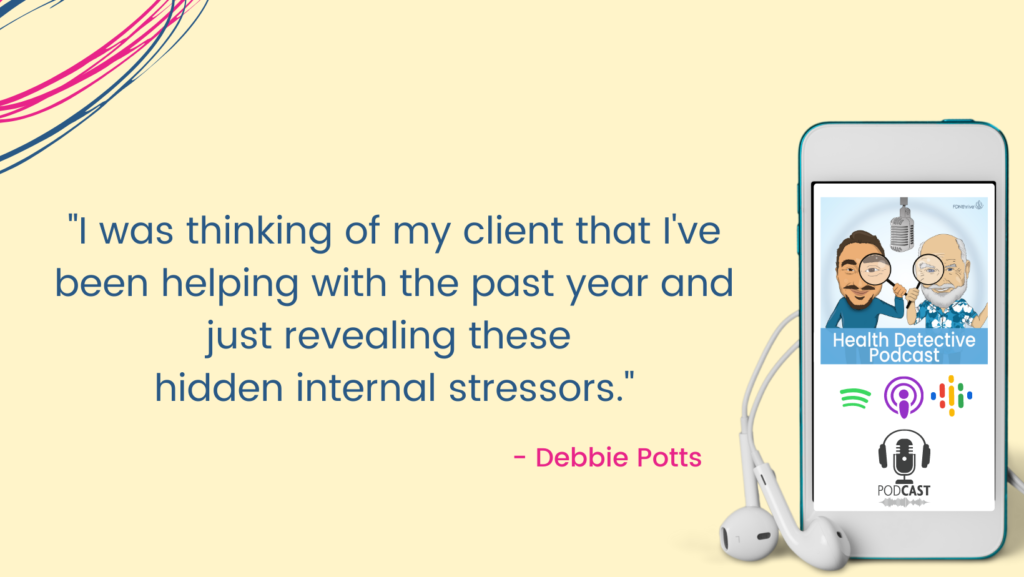
I was thinking of my client that I’ve been helping with the past year and just revealing these hidden internal stressors. So, example, I just retested someone’s labs. I’ll be specific. He wasn’t doing all the right things, like the exercise, nutrition. I’ve been working with him for a year, but we finally did some other labs, like the Vibrant Wellness Zoomers, the Dutch test, did more comprehensive blood panel, waiting for his GI test to come back, and really finding it was wheat. Like putting the foods that he was eating every day that were healthy, were not healthy for him.
And they’re putting gasoline on the fire, so you couldn’t figure. I’m doing all the right things, but why am I not losing weight? Why am I still fatty fit and have this layer of fat over the muscle? Because he’s been working out, doing all the lifestyle habits, doing the hot/cold showers, doing everything we talk about. But until we were able to go, ok, you are highly reactive to wheat.
That’s why I feel like everyone should run the wheat Zoomer and you know, eggs. He’s having eggs every day for lunch, with the cassava flour tortilla. What was on there? Cassava flour. What was on there? Stevia. Every amino acid, other drink mixes that he’s taking pre-workout, post, Stevia. What else was on his test for food sensitivities was turmeric.
Removing Food Sensitivities Has Huge Benefits
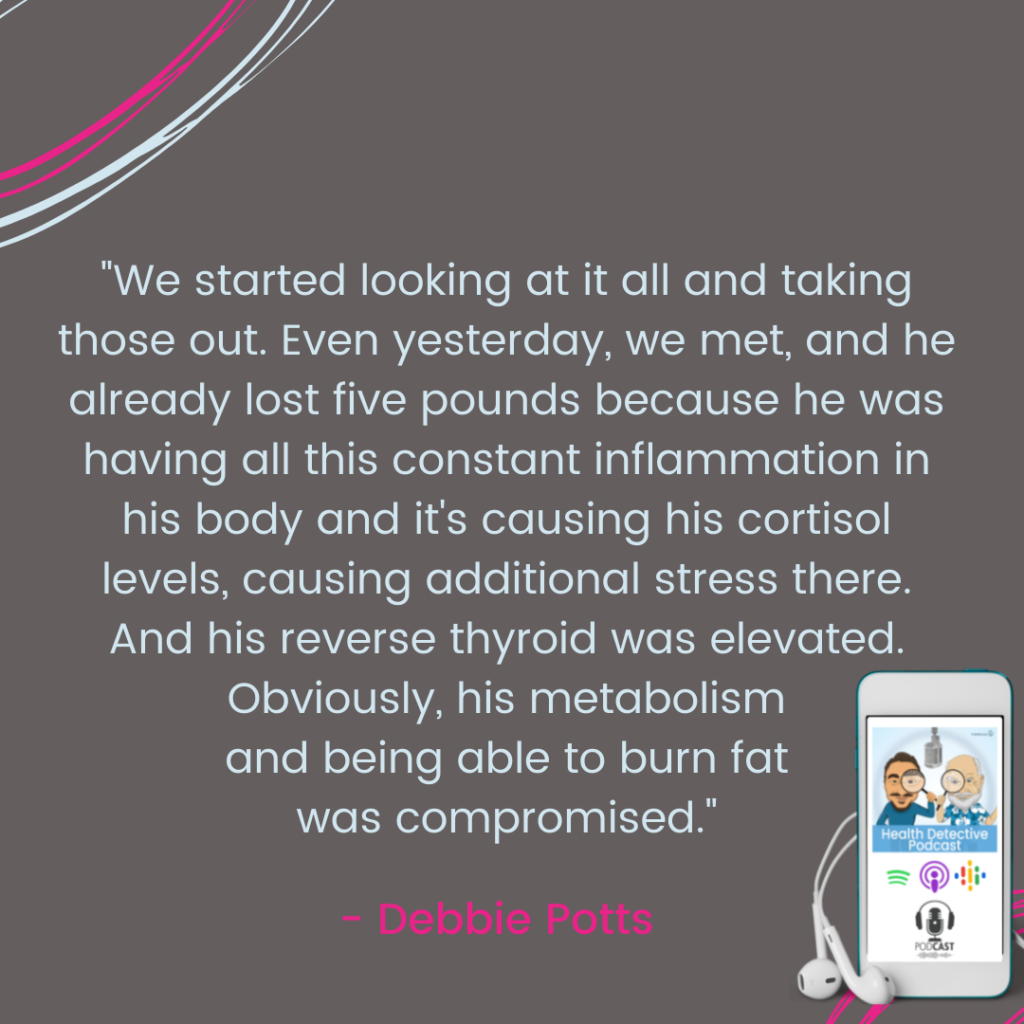
Finally, we started looking at it all and taking those out. Even yesterday, we met, and he already lost five pounds because he was having all this constant inflammation in his body and it’s causing his cortisol levels, causing additional stress there. And his reverse thyroid was elevated. Obviously, his metabolism and being able to burn fat was compromised.
That was just one example, just wheat. It’s just amazing! You think you feel fine, but you see it on a lab test, you’re like, that chronic inflammation could be part of what we’re putting on our body that we think is so healthy, good food for us.
[00:39:26] Detective Ev: Sure.
Well, that’s the kind of stuff I love to hear. Because there’s so many people that wouldn’t necessarily think unfortunately, to look any deeper. But as FDNs, we don’t give up. We know that the body is supposed to be healthy. We keep looking for other stuff and trying to find it.
Sneaky Gluten Attacks
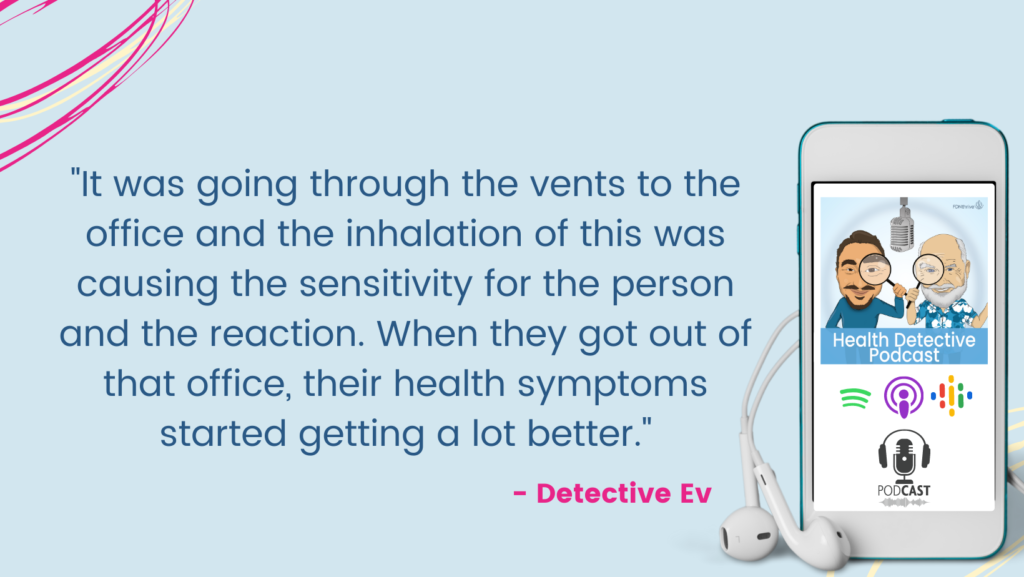
Of course, you know, Whitney Morgan. She is like the gluten queen. She shared a story about someone who was working with her, and they had removed all gluten in every single way. But Debbie, the business next door was a bakery. It was going through the vents to the office and the inhalation of this was causing the sensitivity for the person and the reaction. When they got out of that office, their health symptoms started getting a lot better.
Now for those out there listening, it’s not like we want to create extreme state of paranoia. Like, oh my gosh, I can’t even do something like that. But listen, if you’re unhealthy and you’re doing everything that you can, sometimes we got to make some sacrifices and really figure this stuff out or see the importance of it.
Generally speaking, I might be at an advantage because I’m younger than a decent amount of FDNs (I know the trends kind of shifting with that. We have people from 20 all the way up to 70, it’s kind of interesting.) But the point is I feel like I was able to bounce back from the wheat thing pretty easily. Like, I feel like I don’t have to be as safe.
I’m not ever intentionally consuming wheat, but I’m sure I’ve accidentally got hit with it. I don’t seem to notice anything, or nothing seems to really happen. But my mom, for example, she had her thyroid removed from Graves’ Disease several years back before we ever knew about the FDN stuff, unfortunately. She’s still actively working in a restaurant she used to own. She’s kind of finishing up there helping the new owner. And my mom’s strict with her gluten removal, but I’m now, knowing that story with Whitney Morgan, I’m still thinking, I’m like, it’s just like you said, you think you feel good.
I’m like my mom could probably feel so much better. She has to be getting exposed to this stuff. It’s not like it’s even an organic restaurant. I mean, this is a classic normal cafe. They don’t care about no cross-contamination or anything like that.
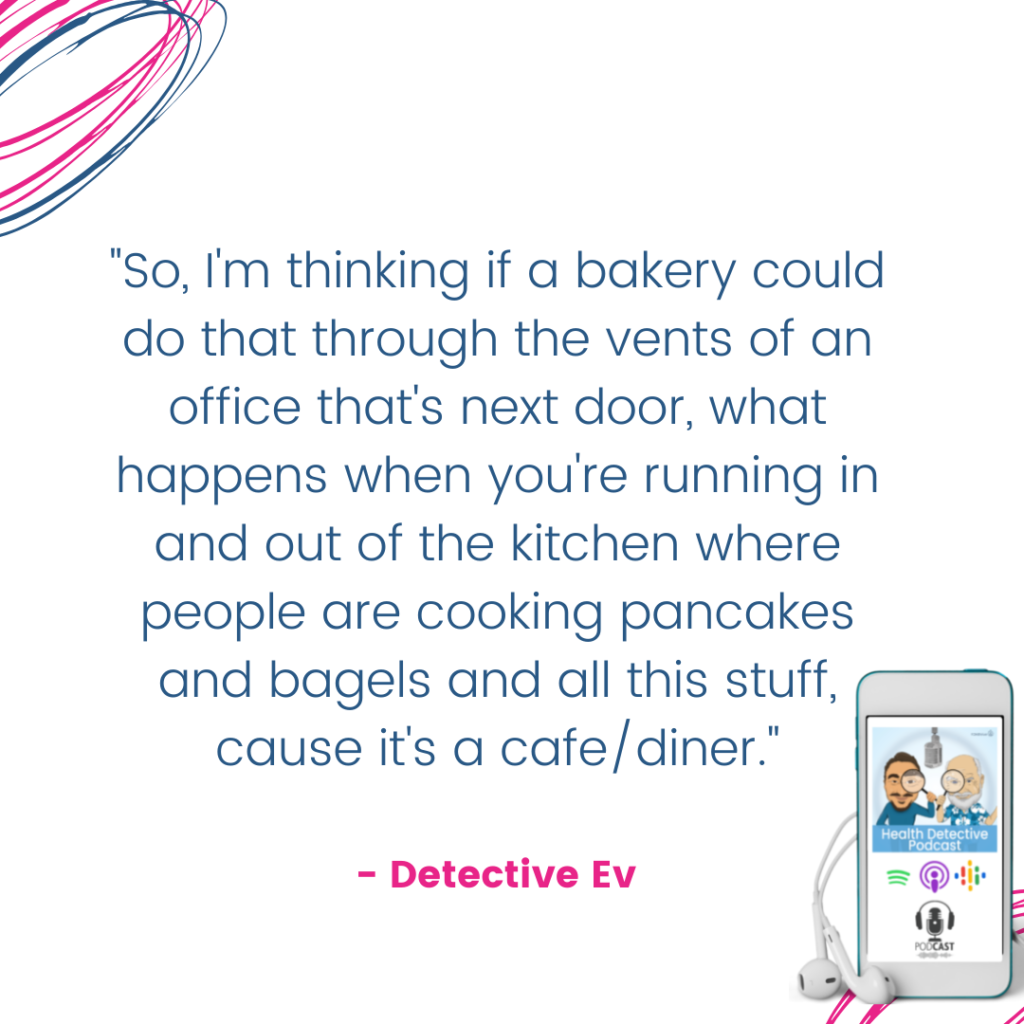
So, I’m thinking if a bakery could do that through the vents of an office that’s next door, what happens when you’re running in and out of the kitchen where people are cooking pancakes and bagels and all this stuff, cause it’s a cafe/diner. Yeah. I mean, people need to know about this stuff if they really want to get to the next level of health.
Sensitivities Are Hard to Explain
[00:41:33] Debbie: My client has just given an example of he’s been living at his parents’ house while he was building a house in a different city. I go, what do your parents eat? You know, cause he’s been eating gluten-free all year, but it’s still in the same kitchen that people are having flour food. It’s tough. You have to take some Gluten Guardian or some enzymes that help that until you can be in your own house with a safe kitchen, but it is something to look at.
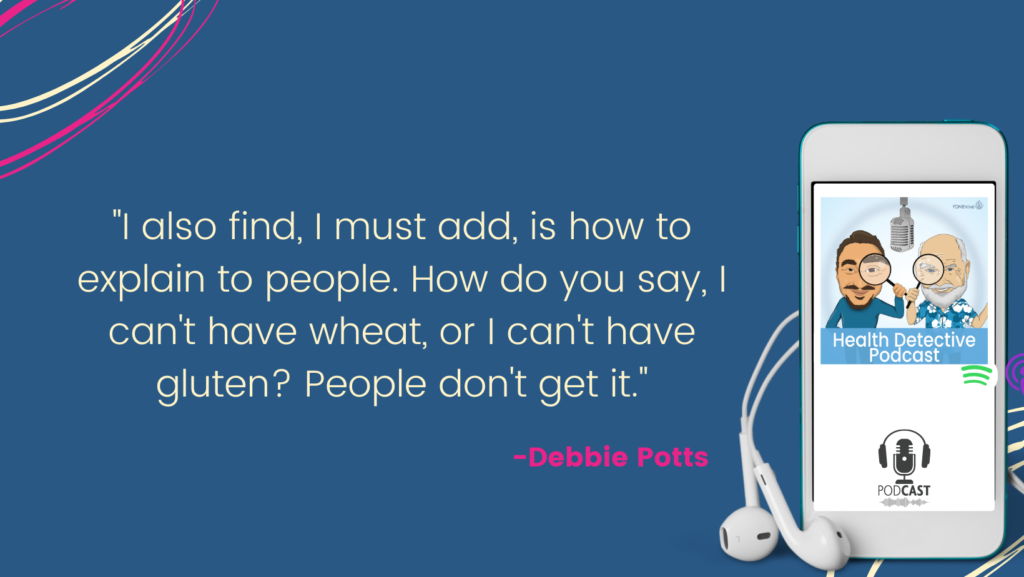
I also find, I must add, is how to explain to people. Because I was talking to Whitney about this. How do you say, I can’t have wheat, or I can’t have gluten? People don’t get it. I was just talking to my client yesterday. So, he’s just going to say, I can’t have wheat cause it gives me migraines. It’s hard to explain to people why you need to be gluten-free without people saying, oh, well, do you have celiac? Well then, it’s no big deal. So, saying, it’s causing some inflammation in my body, he found it easier to say, I have migraines. But just figure out how to get out of it. Like Whitney says just say you have celiac if you go to a restaurant. It’s everywhere you eat out.
I get a headache and I’m just like, okay, Parkinson’s, Alzheimer’s it freaks me out. Like, okay. If my head hurts right away from something that gut brain connection, it’s pretty scary to me. So, it’s more incentives. Like I don’t want to have brain fog, memory issues. And suddenly, you know, 20 years from now, I don’t have any memories. I think learning these, identifying these internal hidden stresses early on is really essential to our health and looking at your future self.
How do I want to perform and live my life 20, 30 years from now? I need to take ownership of my health now, and I wouldn’t have known all this unless I ran the lab test. Because you think you’re doing all the right things, but you don’t know what you don’t know.
Fat Burning is Ancestral Health
[00:43:20] Detective Ev: Yeah, absolutely.
I want to finish up here with a few quick things. One is just a question I’ve been thinking about a lot of this time. You’re obviously someone who’s been in this low carb arena for quite some time, even before other people, certainly mainstream really even started talking about this. I hate to give you a question that seems like such a blanket statement, but I think you’ll get what I mean here.
Do you believe everyone should be fat-adapted? Should everyone regardless of athlete status? Should anyone be eating 300, 400 grams of carbs per day? Or do you think there is a time and place for that maybe based on where they live or something along those lines?

[00:43:53] Debbie: I always look at genetics, look at your ancestors, look at metabolic typing. But I feel like we should be burning fat, that’s ancestral health.
We should be fat burners. That should be your main energy source. We have 40,000 calories of stored fat versus 2000 calories cert carbohydrates. So, to get off that blood sugar roller coaster, we should be burning fat. Now athletes that are active, training high levels, they can still tolerate (I posted a research study of the day on ultra-runners) 300 to 400 grams of carbohydrates and still show ketones. So, I find the question more so is, do we need to be in nutritional ketosis 24/7?
Variability & Flexibility
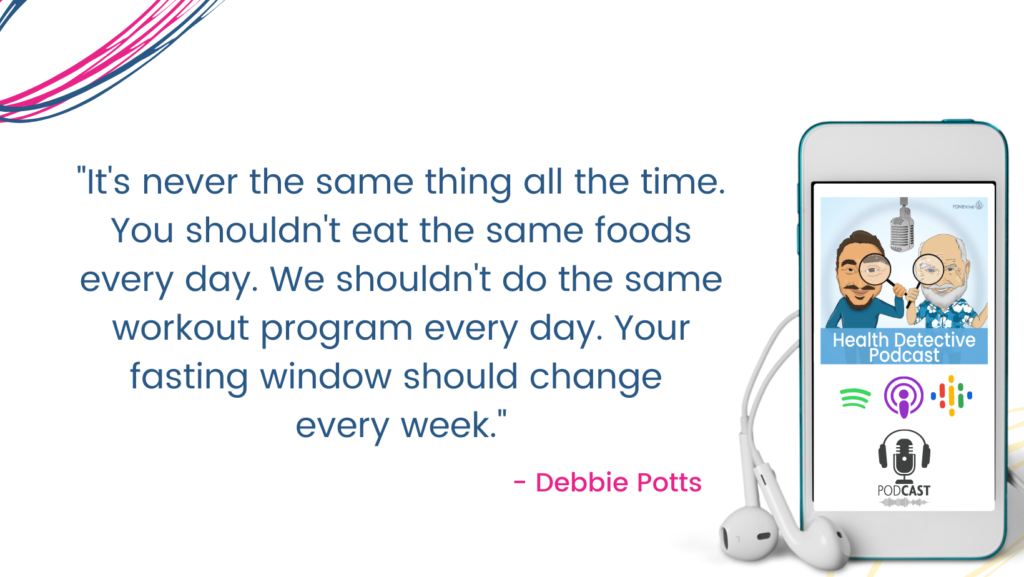
And what the word is I keep hearing in podcasts and sharing this on my own show is that everything is variation. Variability. Flexibility. It’s never the same thing all the time. You shouldn’t eat the same foods every day. We shouldn’t do the same workout program every day. Your fasting window should change every week. Whatever your high carb refeed day, maybe it’s every Sunday, kick yourself out of ketosis. The goal should be metabolic flexibility that we still are able to switch back and forth. If you stay in nutritional ketosis all the time, does that hinder your ability to shift back to burning carbohydrates? Cause we want to have that flexibility. So, varying everything I think would be the key.
But answer to your question, what some people can tolerate (that goes back to the carb tolerance that we’ve talked a lot about my show for athletes), is going to be so different. How many carbs you can tolerate versus someone that’s metabolically damaged and not exercising. Like we’re doing two, three-hour workouts a day working out two, three times a day. I can still burn and consume 100, 300 grams of carbs versus someone else whose given guideline is like 50 grams total day. Dr. Eric Westman says, 20 grams, he starts his people on, of total carbs. He doesn’t believe in net carbs. That’s extremely low.
That’s what my goal is, I feel like my purpose to share, here’s this information we hear out there for metabolic health, but what if you are an athlete? What if you’re an aging athlete, a female athlete, those numbers are gonna be way different.
Net Carbs vs. Actual Carbs
[00:45:56] Detective Ev: I don’t want to open a can of worms, but I will give it to him on the net carbs thing. I don’t understand this because in theory it shouldn’t be digestible, so you shouldn’t be able to get the carbs from it.
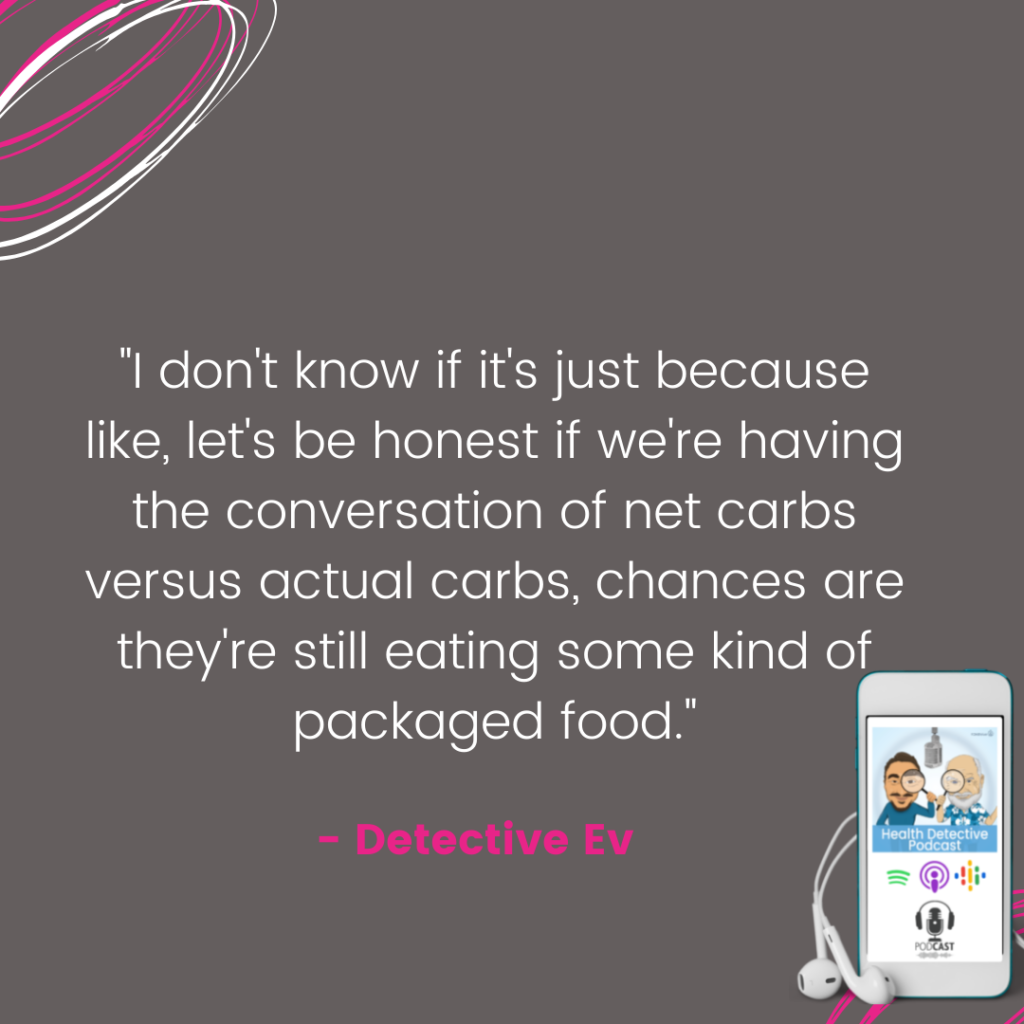
But I have seen some people, they’re not eating net, they’re just eating in general. It does seem like it doesn’t work for them. But for me, it’s always seemed to work fine. I haven’t figured that one out yet. I don’t know if it’s just because like, let’s be honest if we’re having the conversation of net carbs versus actual carbs, chances are they’re still eating some kind of packaged food.
It’s probably different carbohydrates than just vegetables. We don’t know the net carbs of a carrot. So, still in the context of a processed food to some degree, even if it’s organic or whatever, it’s still probably coming in a package that has that label to make the net carbs. So maybe that’s it.
Where to Find FDN Coach, Debbie Potts
With that said, to wrap up I’ve two more things. What is the obvious one? Where can people find you because you have a lot to offer, and I know we’ve talked about a few of those things. We’ll have it all in the show notes, but please recap the main stuff – book, podcast, website, whatever.
[00:46:47] Debbie: Everything’s on the website, debbiepotts.net.
Detective Ev: Perfect.
Debbie: You can find the links to my podcast blog. I have a bunch of free eBooks I’ve put together over the last few years and coaching services on there and everything. debbiepotts.net.
[00:47:02] Detective Ev: Nice and easy.
Debbie’s Magic Wand
The final thing for you then is the signature question we have on the Health Detective Podcast. I always have to preface this with FDNs because we believe obviously in bio-individuality, and we know things could be different for everyone.
So, generally speaking, if we were able to give Debbie in this case, a magic wand, and you could get every single person in this world to do one thing for their health, whether that’s literally do one thing or stop doing one thing, what is the one thing that you would get them to do?
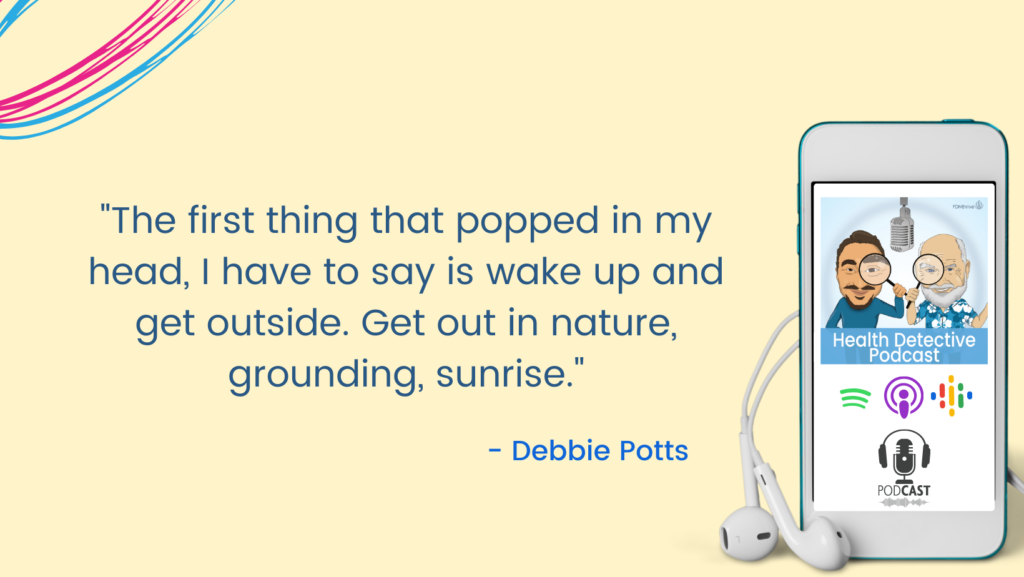
[00:47:31] Debbie: The first thing that popped in my head, I have to say is wake up and get outside. Get out in nature, grounding, sunrise. See the sun, start your day that way. Get outside.
Conclusion
[00:47:43] Detective Ev: All right guys.
Well, we’ve been talking to Debbie Potts, FDN. Someone who has been doing the work for a while and showing people that this is a real thing.
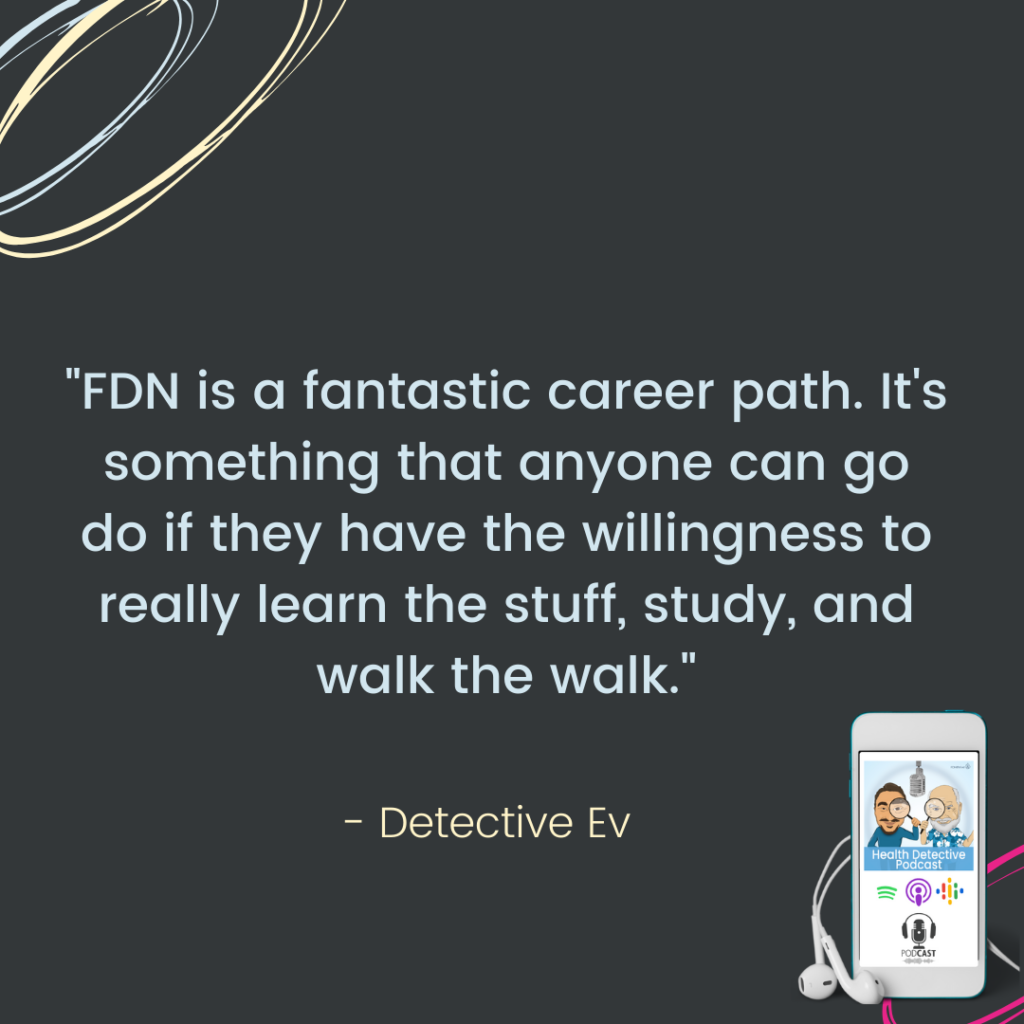
FDN is a fantastic career path. It’s something that anyone can go do if they have the willingness to really learn the stuff study and walk the walk. Reed Davis always says it for the FDN course. You gotta have two things. You got to want to help people and you gotta be willing to walk the walk. You got to do what it takes to become healthy and really live as an FDN Practitioner.
With that said, if you guys like the information that we’re sharing, please be so kind as to leave us a five-star review on Apple Podcasts, as well as Spotify. I am very selfishly on a journey right now to get us to 100 perfect five-star reviews. And if we get there, maybe we’ll do a giveaway for the listeners.
Now I have zero authority to make that promise, but I will figure out something to give away if we get there. Now FDN is pretty cool. I’m sure we could work something out. So, Apple Podcasts search for the Health Detective Podcast and leave us that five-star review. We would love ya even more than we already do.
Hey, I just want to thank you guys so much for listening to yet another episode of the Health Detective Podcast. As always, I’m your host, Evan Transue, AKA Detective Ev. I’ll see you guys next time with another interview. Take care.
[00:49:32] Intro/Outro Voice: Thanks for tuning in to the Health Detective Podcast. If you are finally ready to work with a real health detective on your health journey so that you can get well and stay well naturally, visit us at fdnthrive.com and click on the button to Schedule a Free Health Review.
